#Drew them for Children's Day! (May 5th)
Text



Ducktales Kids with Donald and Della Duck at Space Camp - Getting ready for a trip to space - Ducktales 2017
Ducktales kids with Donald and Della Duck in space suits.
After traveling underwater, it's time for space travel. I drew this to celebrate the release of The Art of Ducktales book as well as the 5th anniversary of the Ducktales reboot. If anyone remembers my drawing of Huey, Dewey and Louie as astronauts in spacesuits: https://www.tumblr.com/ducktoonsfanart/667965460319453184/huey-dewey-and-louie-duck-as-astronauts
Now this time it's done in space camp. Yes I once again drew a Ducktales team of children and teenagers with mentors Donald and his sister Della Duck who will guide them into space travel experiences and how exciting but extremely dangerous they can be. So maybe one day they all go to space, to a place where there is no end to adventures. Della especially knows what it's like to be there, although she's mostly been to the moon. Yes, they all put on astronaut spacesuits and strike their heroic poses before taking a photo together. I took inspiration from the photos of Dewey Duck posing as an astronaut in a space suit when he did his Dewey Dew-Night when he interviewed his mother in the episode "The Richest Duck in the World". It's a shame there wasn't a chance to get his brothers Huey and Louie photographed in spacesuits as well. Oh yeah, there's already a Marshmello video. XD There may certainly be follow-up adventures after this, since this takes up time after the Ducktales finale ends. Besides Donald and Della who are mentors, there are also Huey, Dewey and Louie, Webby Vanderquack, Gosalyn Mallard, May and June Duck, Lena De Spell (Lena Sabrewing) and Violet Sabrewing. I also wanted to add Phooey Duck and Boyd to my drawing, but unfortunately not all of these characters would fit in one place. Behind them you can see two rockets, one Apollo rocket and the other Space Shuttle, and behind them the background of space with the Moon, Mars, asteroid, Jupiter, Saturn, Uranus and Neptune (heavenly bodies, satellites, asteroids and planets) and one new galaxy and certainly full of stars. Who knows what the future holds for them? Maybe they go on space trips and endless adventures. Who knows. Just so you know that family is the greatest adventure.
I hope you like this drawing (three photos of the same drawing) as well as this idea. If you have any quotes for this, feel free to add below. There may be more drawings related to this.
#ducktales#space#space suit#ducktales 2017#donald duck#della duck#huey dewey and louie#webby vanderquack#gosalyn mallard#lena de spell#april may and june#may and june duck#violet sabrewing#lena sabrewing#space camp#space suits#astronaut#astronauts#disney ducks#disney duckverse#disney birds#disney sabrewing#my fanart#fanart#the art of ducktales#huey duck#dewey duck#louie duck#the richest duck in the world!#the last adventure
33 notes
·
View notes
Text
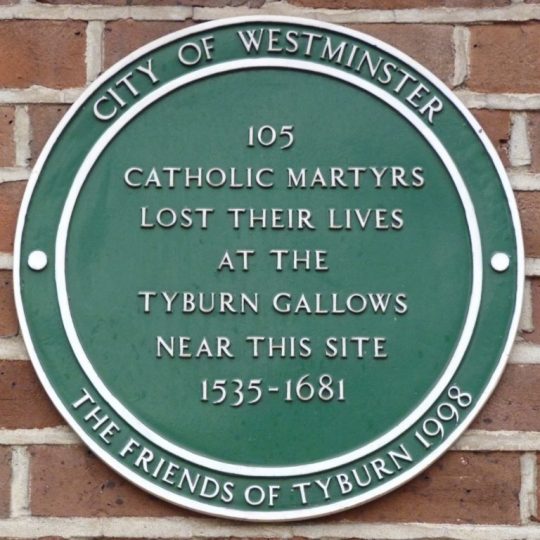
SAINTS OF THE DAY FOR MAY 05
Bl. John Haile, 1535 A.D. Martyr of England, a companion in death of St. John Houghton at Tyburn. He was an elderly secular priest, the vicar of Isleworth, Middlesex, when he was arrested by King Henry VIII’s men. John was executed at Tyburn. He was beatified in 1886.
Bl. Sadoc & Companions, Roman Catholic Dominican missionaries and Martyrs. Sadoc was brought into the Dominican order by St. Dominic himself. Sent to Hungary with a group of Dominican missionaries, he labored among the Hungarians and then went on to Poland, where he founded and served as prior of a Dominican house at Sandomir, in 1260, however, the town was sacked by the advancing Mongols. Sadoc and forty-nine other friars were all put to death while singing the Salve Regina. Feastday May 5
Bl. Edmund Ignatius Rice, 1844 A.D. The founder of the Congregation of the Brothers of the Christian Schools often called the Irish Christian Brothers. Edmund was born in Wescourt, Ireland, in June, 1762, the fourth of seven sons in a fanning family at seventeen he began working at his uncle’s import-export business in Waterford. He later inherited the business. Married at twenty-five, Edmund lost his wife two years later and was left with a sickly infant daughter. A devout man, Edmund dedicated himself to charitable works. Though he saw how the economic and political storms of the day were impacting Ireland, he desired a religious vocation in the contemplative life. However, the Bishop of Waterford drew Edmund’s attention to the bands of ragged youth in the streets, asking Edmund if he, too, planned to abandon them. Encouraged by Pope Pius VII and Bishop Hussey, Edmund sold his business, arranged for his daughter’s care, and opened his first school in 1802.
St. Aventinus, 1180 A.D. Hermit and companion of St. Thomas Becket. A hermit in Tours, France, he was ordained a deacon by St. Thomas and accompanied him to the Synod of Tours in 1163. When Thomas was martyred In 1170 Aventinus went to Touraine, France, remaining there until his death.
St. Hydroc, 5th century. The patron saint of Lanhydroc Cornwall, England.
St. Echa, 767 A.D. Anglo-Saxon priest hermit, also called Etha. He was Benedictine who lived at Crayk, near York, England. Hermits such as Echa served as a link to the early Desert Fathers of Egypt.
S. NUNZIO SULPRIZIO, YOUNG WORKER OF NAPLES
St. Jutta, Widowed noblewoman of Thuringia, Germany, noted for visions and miracles. She married at fifteen and raised children. When her husband died on a pilgrimage to the Holy Land, Jutta moved to Prussia, becoming a recluse at Kulmsee. May 5
0 notes
Text
Ohhhh..."you understand me, I just can't understand you." I am starting to get it now, I think. It must be awfully difficult to exist on a level so much higher than everyone else. It must be a constant source of unfair judgement and accusation as the masses, through no fault of their own, of course. They did not repeatedly pester the gods for inadequate capabilities prior to their birth and that's, literally, the only point where any change beyond cosmetic could have been implemented. I appreciate the patience you have shown. When I was in 9th grade, I used to get stuck refereeing 5th and 6th grade basketball games as punishment for various bad behavior. One particular team was comprised almost entirely of Special Education children....one would think even distribution of these fellas would be in order, but the powers that be in my hometown saw things differently. By fate, or my P.E. teachers' idea of a solid practical joke (I actually can't disagree, honestly) I would ALWAYS get that teams games. It was awful. I couldn't call them for travelling. That'd simply be wrong. This drew the ire of the often smart ass packed, asshole coached, opposing team, The game would feature fouls so brutal that some of these poor disadvantaged chaps may well have added a criminal record to their boxscores had law enforcement been present. These would, invariably, motivate the opposing team to run the score up as much as possible. Eventually, I got wise and had the scoreboard unplugged and kept time via stopwatch (with suspiciously short quarters) to remove the trauma inducing reference point for everyone on Team X who understood numbers. When the game ended, I would find the kid on Team Arrogant Little Fairy so I could look straight in his eyes after the teams shook hands and, with a straight face, announce that yhe game had ended in a tie, but the important thing was everyone competed and had fun. I'm sure you feel in everyday situations not dissimilar to the way I did during that unique scenario....if you are looking for me to express gratitude for hving been placed in it and announce some bullshut like "I learned FAR more from those games than I could have ever taught," forget it. I lie when someone pays me to do so. It's called integrity ;)
Anyway, where was I? Oh yeah. One claim of your's is undisputed. You absolutely understand my position in nearly EVERY point of contention. There's no doubt you understand the seeming frustration, futility, and depressing nature of being forced to think of an unreciprocated love because tumblr reminds me of her all fucking day, but she refuses to communicate one on one in any capacity ever...no meetings, no IM's (yeah, I saw it. Too little. Too late. I wanna see you) So pretend the above jyst says that...i don't wanna change it.
0 notes
Text
Saints&Reading: Monday, March 11, 2024
february 27_march 11
THE MONKS ASKLEPIOS AND JAMES, SYRIAN ASCETICS (5th c.)
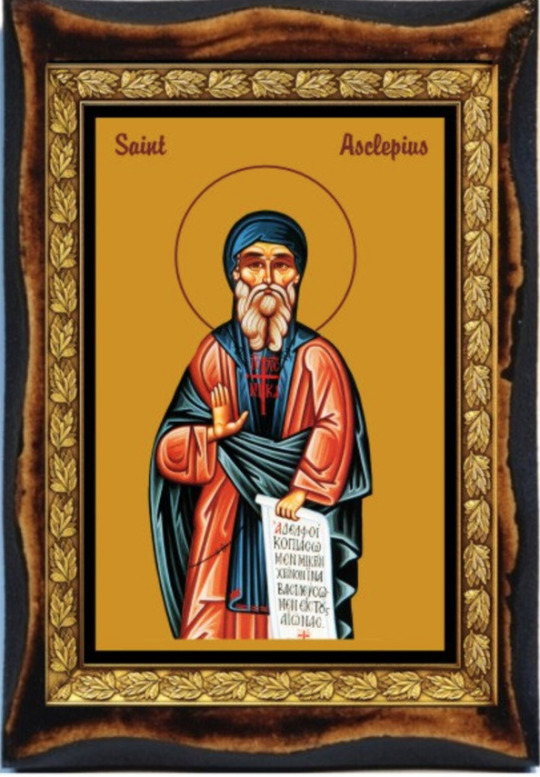
Asclepius
Saints Asclepius and James were Syrian ascetics, and lived during the fifth century. Theodoret of Cyrrhus speaks of them. Saint Asclepius led an ascetic life of temperance in his native village and was not hindered by constant association with many people.
He had many imitators and followers. One of them was Saint James, who secluded himself in a small dwelling near the village of Nimuza. Up until the end of his life, the ascetic did not leave his hermitage, but spoke to visitors through a small aperture in the wall, cut at a angle so that no one was able to see him. He never kindled a fire or lit a lamp.
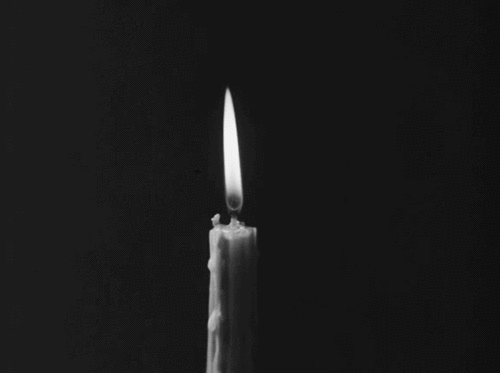

3 JOHN 1:1-14
1 The Elder, To the beloved Gaius, whom I love in truth: 2 Beloved, I pray that you may prosper in all things and be in health, just as your soul prospers. 3 For I rejoiced greatly when brethren came and testified of the truth that is in you, just as you walk in the truth. 4 I have no greater joy than to hear that my children walk in truth. 5 Beloved, you do faithfully whatever you do for the brethren and for strangers, 6 who have borne witness of your love before the church. If you send them forward on their journey in a manner worthy of God, you will do well, 7 because they went forth for His name's sake, taking nothing from the Gentiles. 8 We therefore ought to receive such, that we may become fellow workers for the truth. 9 I wrote to the church, but Diotrephes, who loves to have the preeminence among them, does not receive us. 10 Therefore, if I come, I will call to mind his deeds which he does, prating against us with malicious words. And not content with that, he himself does not receive the brethren, and forbids those who wish to, putting them out of the church. 11 Beloved, do not imitate what is evil, but what is good. He who does good is of God, but he who does evil has not seen God. 12 Demetrius has a good testimony from all, and from the truth itself. And we also bear witness, and you know that our testimony is true. 13 I had many things to write, but I do not wish to write to you with pen and ink; 14 but I hope to see you shortly, and we shall speak face to face. Peace to you. Our friends greet you. Greet the friends by name.
LUKE 19:29-40; 22:7-39
2 And it came to pass, when He drew near to Bethphage and Bethany, at the mountain called Olivet, that He sent two of His disciples, 30 saying, "Go into the village opposite you, where as you enter you will find a colt tied, on which no one has ever sat. Loose it and bring it here. 31 And if anyone asks you, 'Why are you loosing it?' thus you shall say to him, 'Because the Lord has need of it.' 32 So those who were sent went their way and found it just as He had said to them. 33 But as they were loosing the colt, the owners of it said to them, "Why are you loosing the colt?" 34 And they said, "The Lord has need of him." 35 Then they brought him to Jesus. And they threw their own clothes on the colt, and they set Jesus on him. 36 And as He went, many spread their clothes on the road. 37 Then, as He was now drawing near the descent of the Mount of Olives, the whole multitude of the disciples began to rejoice and praise God with a loud voice for all the mighty works they had seen, 38 saying: " 'Blessed is the King who comes in the name of the LORD!' Peace in heaven and glory in the highest!" 39
And some of the Pharisees called to Him from the crowd, "Teacher, rebuke Your disciples." 40 But He answered and said to them, "I tell you that if these should keep silent, the stones would immediately cry out."
7 Then came the Day of Unleavened Bread, when the Passover must be killed. 8 And He sent Peter and John, saying, "Go and prepare the Passover for us, that we may eat." 9 So they said to Him, "Where do You want us to prepare?" 10 And He said to them, "Behold, when you have entered the city, a man will meet you carrying a pitcher of water; follow him into the house which he enters. 11 Then you shall say to the master of the house, 'The Teacher says to you, Where is the guest room where I may eat the Passover with My disciples?" ' 12 Then he will show you a large, furnished upper room; there make ready. 13 So they went and found it just as He had said to them, and they prepared the Passover. 14 When the hour had come, He sat down, and the twelve apostles with Him. 15 Then He said to them, "With fervent desire I have desired to eat this Passover with you before I suffer; 16 for I say to you, I will no longer eat of it until it is fulfilled in the kingdom of God. 17 Then He took the cup, and gave thanks, and said, "Take this and divide it among yourselves; 18 for I say to you, I will not drink of the fruit of the vine until the kingdom of God comes. 19 And He took bread, gave thanks and broke it, and gave it to them, saying, "This is My body which is given for you; do this in remembrance of Me." 20 Likewise He also took the cup after supper, saying, "This cup is the new covenant in My blood, which is shed for you. 21 But behold, the hand of My betrayer is with Me on the table.22 And truly the Son of Man goes as it has been determined, but woe to that man by whom He is betrayed! 23 Then they began to question among themselves, which of them it was who would do this thing. 24 Now there was also a dispute among them, as to which of them should be considered the greatest.25 And He said to them, "The kings of the Gentiles exercise lordship over them, and those who exercise authority over them are called 'benefactors.' 26 But not so among you; on the contrary, he who is greatest among you, let him be as the younger, and he who governs as he who serves. 27 For who is greater, he who sits at the table, or he who serves? Is it not he who sits at the table? Yet I am among you as the One who serves. 28 But you are those who have continued with Me in My trials. 29 And I bestow upon you a kingdom, just as My Father bestowed one upon Me, 30 that you may eat and drink at My table in My kingdom, and sit on thrones judging the twelve tribes of Israel. 31 And the Lord said, "Simon, Simon! Indeed, Satan has asked for you, that he may sift you as wheat. 32 But I have prayed for you, that your faith should not fail; and when you have returned to Me, strengthen your brethren. 33 But he said to Him, "Lord, I am ready to go with You, both to prison and to death." 34 Then He said, "I tell you, Peter, the rooster shall not crow this day before you will deny three times that you know Me." 35 And He said to them, "When I sent you without money bag, knapsack, and sandals, did you lack anything?" So they said, "Nothing." 36 Then He said to them, "But now, he who has a money bag, let him take it, and likewise a knapsack; and he who has no sword, let him sell his garment and buy one. 37 For I say to you that this which is written must still be accomplished in Me: 'And He was numbered with the transgressors.' For the things concerning Me have an end. 38 So they said, "Lord, look, here are two swords." And He said to them, "It is enough." 39 Coming out, He went to the Mount of Olives, as He was accustomed, and His disciples also followed Him.
#orthodoxy#orthodoxchristianity#easternorthodoxchurch#originofchristianity#spirituality#holyscriptures#gospel#bible#wisdom#saints
0 notes
Text

In another lifetime, perhaps they can continue being brothers.

In another lifetime, perhaps they can continue being brothers.
#trash of the count's family#백작가의 망나니가 되었다#tcf#백망되#my art#THE SOOS#choi jung soo#lee soo hyuk#kim rok soo#I LOVE THEM#Drew them for Children's Day! (May 5th)#lout of count's family#manhwa soos when 😭#eap event
752 notes
·
View notes
Text
BRF Reading - 5th of February 2022
This is speculation only
Cards drawn on the 5th of February 2022
Question: What does Eugenie think of the Cambridges?

Interpretation: She likes them, she has fond memories of a shared past, and she is currently upset at them.
Card One: The Four of Cups. This is the card of emotional discontent, of not seeing or taking what is offered because you are so focused on what has gone wrong. In this deck it is my card for gossip, but in this reading the energy is firmly that of emotional discontent.
Eugenie is unhappy with the Cambridges. This isn't anger or plans for revenge, it is simply a feeling of 'I am unhappy with what you have done'. We saw from the last reading that she was unhappy with what she saw as William's treatment of her father, and I think this unhappiness comes from the same cause. The card shows Psyche listening to what her sisters say and letting that sow seeds of doubt about her marriage. In Eugenie's case, she has had seeds of doubt sown not about her marriage, but about her place in the BRF. She feels insecure. Doubts are niggling at her. She is unhappy over how her father was treated, and she is wondering if one day she might be treated the same. The energy from this card is of niggling discontent - I want to change this but I don't know how, I'm unhappy with my current situation - not overwhelming unhappiness, but the niggling of doubts that eat away at contentment.
The Four of Cups can be a card of going inwards, to adjust your emotions with respect to new information or a new phase of life. I think this is what Eugenie is starting to do - go inwards and think what do I want from the BRF? What position in this family will make me happy? - and so she is starting to sort out her reactions and deal with her unhappiness. This will happen slowly (Cups are not a fast moving suit, they are the third slowest suit in the deck), but this is the beginning of it.
Card Two: The Sun. This is a very positive card, the most positive in the deck. Having it appear in the spread makes all the other cards less negative in meaning. With respect to the Cambridges, this means that underneath the hurt she is feeling at the moment, Eugenie really does like them and admire them. She generally has a good and positive relationship with them. She may see them as 'being in the sun' with respect to the BRF, i.e. getting the good stuff, but she understands that is because of William's position as the eldest son of the heir to the throne. Eugenie does like the Cambridges and she does want to be on good terms with them.
Sun sounds the same as son, and that tells me that this is all about the sons in the family - Andrew and William. That is where the unhappiness of the Four of Cups comes from, and the Sun card says that unhappiness can be dispelled and will be dispelled if Eugenie continues on the path of going inwards and sorting through her feelings and reactions to her father's loss of status.
I drew two clarifiers for this card, and they were:
Clarifier One: The Five of Wands. This is a card of conflict, of arguments, of having to fight for something. The card shows Jason and Medea fighting a dragon for the golden fleece. This says to me that Eugenie is currently in conflict with William over the golden fleece i.e. her and her father's 'royalness' and status within the BRF. There isn't a huge fighting energy from this card. The energy is more that of squabbles and hurt feelings. It could erupt into a major conflict, but it isn't there yet.
Clarifier Two: The Six of Cups. This is a card of nostalgia, of children, of looking back fondly on the past. This tells me that Eugenie has very good memories of her past with the Cambridges, especially her shared childhood with William. Those memories from a strong bond of affection that underlies her current conflict with William.
Card Three: The World. This is the card of the end of a cycle, the successful completion of a project. With respect to Eugenie's feeling of discontent, this says that what is done is done, there is no going back. She can look back over the past and see what led up to her father's loss of status, but that decision is not going to be reversed.
With respect to the Sun card, the Sun is the ruler of Leo, the sign of royalty and of the lion of England, so here the World card refers to the current situation of Elizabeth's reign drawing to a close and the future ascension to the throne of Prince Charles, and then William after him. The King is dead, long live the King - it has that sort of energy of the inevitable ending of one cycle and the beginning of the next. In this sense it is a warning to Eugenie - she can indulge in her upset feelings for now, if she likes, but at the same time she needs to get them sorted out so she is ready for the future.
The Sun and The World are the two major arcana cards in this reading, and as such they are the main energy of the reading. Eugenie can be upset over the treatment of her father, no one is denying that, but in the end her father has been pruned back (the son of the monarch), the monarchy will continue shining (the Sun) and the cycle of monarchs will continue (the World). Is it worthwhile carrying her feelings of emotional discontent into this future? This is what she has to decide for herself.
Underlying Energy One: The Seven of Swords. This can be the card of deceit, the card of the thief, but it can also be the card of diplomacy, and that is the energy that I am getting from this card. The card shows Orestes using his wits and his guile to get into the city and palace to kill his mother. It is a dark situation and Eugenie needs to use her wits and her guile to navigate her current situation.
Does Eugenie intend to 'kill' not her mother, but the person she blames for her father's loss of status (William)? I don't know. I don't think Eugenie knows. This card is saying that at the moment she is lying low, assessing the situation, and using diplomacy to mask any intentions, good or bad, that she has for the future. With respect to the Four of Cups, this could include diplomatically refusing any positions or opportunities offered to her as she is not sure if she wants to take them up or not. I'm not getting any disguised malice from this card, but I'm also not getting any good intentions. The energy is very much that of speaking softly, lying low, and waiting to see what happens.
Underlying Energy Two: The Four of Pentacles. This is a card of hanging on to what you have for dear life, keeping it for yourself, not wanting to share with others. The card shows Daedalus hanging on to four golden pentacles and not sharing them with his nephew, and that is the energy I get from this card - hanging on to status and not being willing to give it up/let go of it. This was the secondary underlying energy in the last reading I did on Eugenie, and now it is showing up here again.
The energy is the same as in the last reading. Eugenie is worried that she will lose her HRH and her status within the BRF, and she is hanging on to that HRH and status for dear life. She does not want to let it go, and for some reason she sees it as being threatened. It feels like she is worried because of what happened to her father, a shock that brought home the fact that this could also happen to her. Eugenie is digging her heels in and in effect saying 'No, you can't have it, it is mine'. The loss of her status is a worry to her and it is the feeling that is driving this whole spread - the need to hang on to that status.
Conclusion: Eugenie is currently unhappy with William, but she also likes him and has fond memories of their childhood together. Her current emotional discontent springs for the loss of status of her father, a loss that she fears could happen to her. This fear is driving her actions.
She is having difficulty accepting her father's loss of status, and the fear that it could happen to her is one of the reasons she is having difficulty with it. She is in conflict with William about this - a minor conflict for now (pouty hurt feelings and petty acting out), but it could grow into a major one in the future.
Eugenie needs to go inwards and examine why this action has upset her so much and to come to terms with it. This can include looking back over the events that lead up to her father's loss of status and understanding how and why it happened, and accepting the possibility that she may lose her HRH under her uncle's reign. The monarchy will continue regardless of her hurt feelings. Charles will be the next king, William will be the king after him, and Eugenie has to asses whether it is worthwhile carrying her hurt feelings into the future, or whether it is better to examine them, reconcile herself to current events, and to let them go.
Eugenie's current stance is to lie low, speak softly, be diplomatic, and just watch and see what happens. This is not a bad position for her if she is working on the how and why of her hurt feelings, but it could be a cover for devious behaviour if she decides to hand on to her grievances and work against William and his father. The choice is hers and at this point in time there is no indication from the cards as to which way she will go, only that she is starting her internal work. However, the Sun card, as an overall positive card, makes me hopeful that she will sort herself out emotionally and go back to the previous good relationship she had with her cousin.
35 notes
·
View notes
Text
Mutant!Marko redesign
I was informed rather aggressively in my DMs that gecko tails "don't fucking look like that" and I wasn't going to change it because they were rather rude, but out of curiosity I drew it to see how it looked and dammit. I love it. I'm boiling. But I love it. So Marko gets the THICC gecko tail now, + a slight outfit adjustment

Poor geckosaurus, so smol, he has to wrap the belt around him twice and it's still falling down.
Okay, I promised lore for the next AU post, so here goes;
Okay, so this au is still in the bunny phase, and therefore subject to change, so if you're particularly attracted by anything I mention, lemme know cuz it might not be Canon tomorrow.
🦆
Aight, so we'll start with
Luchasaurus

Luchasaurus is some kind of ancient species that lived in the wilderness and known to be mystic guardians of some long-forgotten secret. Long ago they were hunted nearly to extinction by parties unknown, some managed to integrate into human society, although living away from their forest greatly reduced their lifespans. And while hybrid children of these integrations exist to this day, Luchasaurus is effectively the last of his kind.
He's very old.
Old as balls.
He's not immortal, but because he's never left his forest, he has a potentially very long life still ahead of him. In terms of his species, he's far too young to have kids, not that the universe cared when Jungle Boy, and later Marko, appeared in his life. He sees himself as more of a much older brother to his self-claimed wards than a father figure.
He despises litter, and works hard to keep his territory clean. The only exception is books, every now and again, a book will end up in his territory, usually washed up from the river, and he'll take them back to the cave and dry them out. He's accumulated quite a collection, and he's rather privy to the history ones.
(Whenever JB or Marko want something, they'll usually find a book to use as a bribe before asking.)
While he enjoys that both boys are naturally free spirits, he can't help but be paranoid about either of them leaving the forest. There are still people out there looking to find the last Luchasaurus.
Jungle Boy
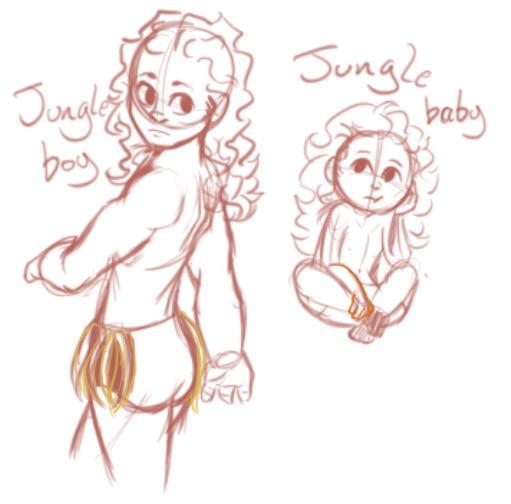
The story kinda alternates between when JB was a baby and it was just him and Lucha stumbling through the trails of parenting, and later on when he's a bit more grown and Marko has joined the pack.
Lucha found Jungle Boy after a storm outside his cave, he was maybe two years old, he tried finding his parents, but there was no one to be found. He sometimes thinks it would have been better to venture out of his forest just once, try to find an orphanage where Jungle Boy might have been able to get a normal human life, but he doesn't regret keeping him.
JB doesn't remember life outside the forest, or his real parents, the closest he's come is occasionally seeing traps that hunters leave. Big traps, big enough for a dinosaur. He's become quite adapt at disabling them. Sometimes he'll think he hears voices in the night, but on those nights, Lucha is very strict about staying in the cave. So humans don't have the best reputation in his eyes.
Despite this, he can't help but be curious, especially since Marko joined the pack, bringing with him stories about things called "cities" and "cars" and "hotdogs". Lucha doesn't like Marko's stories as much as Jungle Boy though.
Marko

(I have a bet going with myself to make Marko's hair more fluffy every time I draw him, and I'm already losing)
Marko is one of those hybrids I mentioned. 5th generation. Most hybrids have lost the instincts of their sacred ancestors, but Marko has just enough in him to always feel a pull towards the his calling. It was one night he decided to let his instinct guide him, and ran away from home, into the wilderness, trying to find his destiny.
He got lost.
Very, tragically, hopelessly lost.
Marko may have the instincts of a mystic guardian, but he's a born and raised city kid, and was in no way prepared for outdoorsmanship.
He's lucky JB found him before something hungrier did.
Luchasaurus was initially skeptical about keeping Marko around, but... he's the closest Lucha has seen of his own kind in a very long time, and he's weak to JB's pleading.
Marko was ecstatic to meet Luchasaurus, and begged him to teach him about the old guardians. A task that Luchasaurus has taken on cautiously, but Marko's enthusiasm has loosened him up about the subject.
OK that's all I got so far. If there's any questions, feel free to send an ask, I work best at writing lore when I'm discussing it with people and it gives me an excuse to draw more. Love y'all!
Oh yeah, I guess this is also a response to this ask

@eivorwolfkicked sweetie, I'm so sorry it took so long to get to your ask, I hope you like the story so far
#jurassic express#jurrasic express#wrestling au#wrestling fanart#wrestling art#jungle boy#jungle boy jack perry#jack perry#aew#all elite wrestling#aew on tnt#Aew au#luchasaurus#marko stunt#Monster!luchasaurus#Hybrid!marko#Feral!jungle boy#professional wrestling#I'm also planning on introducing an antagonist for this au#But I'm going back and forth on either the dark order or the inner circle#I'll have to come back to that#Ask#Technically#feedback is nice
18 notes
·
View notes
Text
ZevWarden Week 2020

What is it? A week (July 1st - July 7th) of creating new content, sharing it and celebrating the wonderful ship of ZevWarden!
How to participate: Feel free to follow the daily prompts as inspiration for whatever ZevWarden-related content your heart desires. Fics, art, meta discussions - everything goes! Remember to tag your works appropriately (ie. #nsfw) and most of all, have fun!
There are TWO prompts per day so pick whichever one inspires you!
Tag your content with #zevwarden week 2020 and it’ll be reblogged here.
***Any art found to be whitewashing Zevran will not be posted
Wednesday, July 1st: EYE OF THE BEHOLDER [identity][admiration]
Thursday, July 2nd: LA PETITE MORT [death][weak spots]
Friday, July 3rd: "OH MAKER" [faith][first times]
Saturday, July 4th: CANDLELIGHT WHISPERS [opening up][pillow talk]
Sunday, July 5th: ANTIVAN BAD BOY [tattoos][kink]
Monday, July 6th: BLOODSTAINED CLOTHES [injury][dressing up]
Tuesday, July 7th: #RELATIONSHIPGOALS [flirting][the future]
Descriptions of each prompt under the cut:
Wednesday, July 1st
EYE OF THE BEHOLDER
Identity
“A Dalish whore, thank you very much. It was my sole distinction amongst the other elven boys in the whorehouse.”
How does Zevran feel about his identity as a Dalish (or not, as the case may be)? Does he struggle with the diaspora? Does that change after meeting your warden? Do they ever try and find his family? Does your Warden also struggle with their identity, or belonging?
Admiration
“We all have our reasons for doing what we do. Mine happen to come with a set of strong hands/lovely eyes.”
What are the things that Zevran admire about the warden -- both appearance and personality? What first drew his attention? What about the contrary? What is it about Zevran that makes your warden’s heart swell and their undergarments wet?
Thursday, July 2nd
DAY 2: LA PETITE MORT
Death
“Oh, I'm not going to die. It's always the Grey Wardens that die. Did you not read stories as a child? The hero always dies.”
Does the warden sacrifice themselves, do they live to hear the Calling, or do they find the cure and reach old age along with Zev? Who dies first; how? How does the other deal with the grief? Do their friends and family (children?) help them heal?
Weak spots
“Hmm. Now that you mention it, I... I suddenly rather feel like a delicate mushroom…”
What do you HC are Zevran’s weaknesses in bed? What gets him “spilling liquid everywhere” like a delicate mushroom? How does the warden find out about it? What does Zev do that makes the warden weak? Do either of them have an innocuous ‘thing’ that just makes them melt?
Friday, July 3rd
"OH MAKER"
Faith
“And I ask forgiveness for my sins from the Maker every chance I get.”
How do you HC Zevran’s relationship to faith, Andrastianism, etc? Does he believe, or is he cynical? Does he hold a grudge against the Maker? Fear Him? Pray to Him? How do his beliefs (or lack thereof) play out next to the Warden’s?
First times
“I grew up amongst Antivan whores, men and women both. My introduction to the subject of sex was, shall we say, rather practical.”
How did Zevran’s first time with the warden go? Were they a virgin, or an experienced lover? Do they stumble trying to find out what the other likes? And how do you HC Zevran’s introduction to sex actually went -- how did it affect him? What about the Warden’s, if Zev was not their first? Do they ever talk about it?
Saturday, July 4th
CANDLELIGHT WHISPERS
Opening up
“It... feels good to speak of it to someone. I swore I never would.”
How long does it take for your Warden and Zevran to trust each other enough to open up? When does Zevran tell them the truth about Rinna, about his pain? How freely does the Warden show him their deeper secrets, wishes and traumas? How do they comfort each other?
Pillow Talk
“You Fereldens are so finicky. How will you ever learn how to pleasure each other unless you talk about it?”
Was your Warden used to talking about sex at all, or were they a “finicky” Fereldan? How does Zev ease them into it? What are the aspects of sex about which they talk? Are there any incompatibilities between them that they have to work out? Is there anything the Warden (or even Zev) is embarrassed of and takes time to talk about/bring into their sex life?
Sunday, July 5th
ANTIVAN BAD BOY
Tattoos
“Ohhh, yes, yes. But it is not so bad, in truth. If you like, I could give you one. I learned a bit of the art myself in Antiva.”
Tattoo artist Zev -- is it canon in your canon, or was he just messing around with Alistair? Does he ever give your Warden a tattoo? What is it of? How does it go? Who brings it up first?
Kink
“Now that I've mentioned tying me up in that context, do we have extra rope about?"
Zev talks about getting tied up so often it’s hard to choose just one rope quote. Is he thirsty for rope-play/BDSM in your canon? What about your Warden? Do they get kinky in the bedroom? Do they tie Zev up, gag him and spank him, or vice versa? Does it ever end badly by accident? How do they deal with it when elaborate sex takes unwanted turns?
Monday, July 6th
BLOODSTAINED CLOTHES
Injury
“I haven't been this hurt in... well, ever!”
Zevran’s Crow training was no cakewalk, but how do you HC Zevran handles injuries? How does the warden take it when Zev gets badly hurt? Or vice versa? Do Zev or the warden ever get poisoned, seriously ill or have a major brush with death? What of magical injuries? Do they use magic to heal -- if your warden is a mage, is this a comforting ritual for Zev?
Dressing Up (or down 😏 )
“I’ve always removed my clothes strictly on an amateur basis. A talented amateur, but an amateur nonetheless.”
Do you HC Zevran enjoys dressing up for a fancy party, an infiltration job, or even a tumble between the sheets? Has he ever done a strip-tease for the warden or vice versa? Do they roleplay in full costume in the bedroom? Do they enjoy shopping for clothes together? What is their fashion sense? Would they dress up for a Halloween party in an AU? What costumes?
Tuesday, July 7th
#RELATIONSHIPGOALS
Flirting
“Do you stare at everyone like that?” “Not everyone.”
Zev is such a good flirt he can stare off a lass’ six layers of skirts. How does the warden feel at first, being the object of Zev’s flattery? How do they respond? In what ways does it change as they get closer? Do they get the habit of telling each other awful pick-up lines? Do they keep flirting like two idiots even years later?
The Future
“How should I know? I cannot see the future. What if I liked it here? What if we became fond of each other, hmm? Stranger things have happened.”
Does Zevran find a home with the campfire crew; with the warden and their family? Do they start a family? What strange things he’d never expected end up surprising him in their journey? What shocking twists does their future hold? What Post-Blight adventures do they have?
#zevwarden week 2020#zevwarden week#zevwarden#zevran x warden#zevran arainai#masterpost#zevwarden week 2020 masterpost#prompt list#dragon age#dragon age origin#zevraholics anonymous#event#dragon age fanfiction#dragon age fanart
316 notes
·
View notes
Text
I am sure many of you have already read this one but here are some parts from Ash Alexander’s Queen journey for those who haven’t!
“...At some point in early At some point in early 1983 on a visit to Jacky at the QFC, John Deacon wondered into the office. He came into the basement office and said hello as Jacky introduced me, sat down and spent a little time reading through press clippings. He could easily have slipped away back upstairs, but the fact that he stayed was a nice touch.
Another fan club letter arrived with good news. In Another fan club letter arrived with good news. In November 1983, fan club members were invited to help in a video for the new single 'Radio Ga Ga' at Shepperton Studios. Again, my Mum stepped up and drove me down for the day. I took the day off school and had just turned 14. We arrived at the studio and were ushered into a huge hanger where we were kitted out with white body suits and then sprayed with a light grey stripe on each arm - even now I’m not sure what the spray paint was for as you can’t see it in the video. When we had all been prepared, we were taken into an adjoining hanger and were greeted by the band and an initial play through of the song. The rest of the day was spent clapping as you’ll see in the video. I wound up in the front row, opposite Brian. If you look closely and you know what you’re looking for, you can see me!
In between takes, I approached John Deacon who was surprisingly on his own. I remember trying to remain calm as I approached him. I didn’t mention our brief meeting, I asked him how to get a job in recording studios and that I was interested in pursuing a career as a sound engineer. He was really helpful and took time to explain the usual route.
On 22, March 1984 at Limehouse Studios in London’s docklands, the video for ‘I Want To Break Free’ was filmed, again with the help of fan club members. I went along with my brother Andrew. The set was a big dark staircase that we all stood on. We were given black bodysuits this time that were sprouted with hello paint on the arms. We also wore a hard hat with a head lamp attached to it. The band were set in the middle of us all. After all the filming, we returned to the main building where we said hello to Roger. He’d come out to say thanks. Later, waiting for a cab down in reception, Freddie glided down the staircase and past us with his entourage. I remember wanting to get up and say thanks, but the opportunity was missed.
...20th April 1992. My friend Chesney Hawkes was managed by Trinifold. They also managed The Who. He invited me along to the Freddie Mercury Tribute gig at Wembley. Roger Daltry was appearing and Ches had a spare ticket. He only had one backstage pass though. This was overcome by him befriending the chap on the security door. Ches came out to meet me with his pass. He returned on his own and got in. I confidently flashed my pass and entered the Hard Rock tented area. Ches beckoned me over from the other side of the room. He was signing autographs for a lady, her two children and an older lady was with them. He introduce me to them saying I was a huge Queen fan. ‘This is Freddie’s mother' he whispered to me. I remember saying to her that I wish we’d met under different circumstances and how deeply sorry I was about her loss and how incredibly proud she should be. I often wonder about her.
...In Spring 1993, I was in front office. It was well after midnight and I’d left a s session for a little break. As usual, I took a look in the studio diary to see what was coming up. I flicked through the weeks and came upon an booking entry “Studio 3 - QUEEN” for 2 weeks that was pencilled in. There was no further info than that. I put my initials next to the booking thinking there would be a rational explanation as to what the booking really was. I soon found myself on a 2 week session with Queen.My diary from 1993 is lost, so I have only a mental note as to when & what songs were touched upon at this initial stage of 'Made In Heaven'. We started taking delivery of various multitrack tapes on varied formats. These were then transferred to digital 48 track tapes for future work. Roger & John were alone on these sessions as Brian was touring in Japan. I remember Roger being rather dismissive of Brian being unavailable, much like a brother sledging his sibling would do, with a slightly jealous edge but genuine at the same time.
...Over the 2 week session, Roger would suggest we went out for dinner. We had 3 or 4 meals out at a local Italian restaurant. Even now I laugh at jumping into the back of Roger’s Merc and the four of us driving down Abbey Road to the restaurant. It was owned by an Italian lady that would force you to smell her ‘wonderful mushrooms’ from a jar, which she made Roger do. On our initial meal she told Roger he looked familiar. ‘I know you’, she said. ‘Where have I seen you before?’ ‘Well, I’m in a band and we’ve been on TV before.’ Roger replied. John seemed calm with his lack of recognition. ‘What group do you play for?’ she asked. ‘I’m the drummer in a rock n roll band called Queen’ he replied. ‘No - I don’t hear of this band’ …We finished our food and the bill was called for. It showed up. John took it and asked Roger if he should use the Queen card to pay for it or his own card.
Roger’s drum kit arriving half way through the first week of sessions was a surprise for Noel Harris (the engineer) & me. We expected the sessions to be playing back tapes and working through the various formats to find possible material to be worked on at a later date. Noel was unfamiliar with the room in studio 3 and asked my opinion where to set the kit up and what microphones I would use. Eventually he left me to it. The kit was positioned and I mic’d it up that evening. John had his red Fender bass DI’d (no amp was used) and sat with us in the control room. I doubt these recordings made it through to the final mixes, it’s nice to think that they did.
...Tuesday 5th September
During the afternoon Brian’s guitar and a Vox AC30 appeared in the studio, brought in by Pete Malandrone. We were to do guitar overdubs on ‘You Don't Fool Me’. David asked me to put two Shure 421 microphones pointing into the back of the speaker cabinet. We did have two SM57’s on the front but these weren’t used in the recording.
I had to do a recall of the mix, which meant noting all of the studio outboard settings so we could get back to the mix and finish it off.
We had a technical problem with the Sony 3348 tape machine and eventually had it swapped for a new one. Brian clearly wasn’t aware we weren’t ready for him. I was half way through telling him and Jim Beach jumped in and finished off my explanation. Brian got really cross with him and slammed an empty coffee mug down on the studio table. Later Brian was so apologetic for his outburst. He must have told Jim he was sorry 4 times. As I type this I note it was Freddie’s birthday.
Brian slipped on his guitar that was linked to his amp with one lead. No pedals. His sound was instant and we were soon ready to record. He stood in front of the console in the control facing David & me.
Brian had an idea of what he wanted to play. The guitar riff had already been recorded. The solo guitar is what was added. Brian used a scrap of paper that he drew a map of dots on. Not like musical notation but his own short hand. It reminded me of being at the 'Radio Ga Ga' video shoot 13 years earlier. I was the same distance from Brian as I was then, but the scenario was beyond my imagination.
...Friday 8th September
Day Off - I may have met Pete Malandron at the Sun Inn in Barnes this afternoon. The QIFC was based round the corner at the time & Brian had a house there too, although I'm not sure he lived there at the time. I was with a friend and Pete joined us in the pub. He sat near the window and kept looking out of it. I asked what he was looking at and he replied "I always get worried when I'm out with Brian's guitar. It's in the boot of the car you see." He stayed for one drink and decided it was time to leave.
...One of the evenings of this second week, George Michael came to visit. There was a strong possibility that he would sing on one of the songs. Roger, John, Brian, David, George & I sat chatting in the control room. One of the conversations moved onto the Beatles and their current 'best of' release. I think Brian suggested that it was a bad idea releasing all their old material and I piped up that the fans would buy it regardless, much like the scenario Queen were about to face with the imminent release of the album. There was a deathly hush as I realised what I was saying. I wasn’t being at all derogatory. I was helped out of the hole I was digging by George who agreed with me and we moved on. No one actually spoke about doing a vocal. After George left the studio that evening, Roger was clear that he wasn’t keen on the idea.After looking through the Vintage Car garage across the road from the studio one afternoon, Roger saw a black Cadillack convertible that he quite liked. The following morning he came into the studio and said ‘Don’t tell Jim, but I bought the car.’ It was £80, 000.
Brian asked me if had been involved in the Abbey Road Sessions. Perhaps he’d seen my name on the tape boxes. I said that I was. Immediately he made a phone call. I didn’t hear all that he said, but I knew it was about a special thanks on the album credits. The following morning, after the artwork had been finalised, Roger came in and said ‘morning Aardvark’. Because the special thanks were alphabetic, I was on top of the list. It wasn’t until I bought a copy of the album and saw my name on it that I finally took on board that I had actually achieved one of my dreams.”
60 notes
·
View notes
Text
Cronus
Not to be confused with
Chronos
, the personification of time.For other uses, see
Cronus (disambiguation)
.Cronos
In Greek mythology, Cronus, Cronos, or Kronos (/ˈkroʊnəs/ or /ˈkroʊnɒs/, US: /-oʊs/, from Greek: Κρόνος, Krónoς) was the leader and youngest of the first generation of Titans, the divine descendants of Uranus, the sky, and Gaia, the earth. He overthrew his father and ruled during the mythological Golden Age, until he was overthrown by his own son Zeus and imprisoned in Tartarus. According to Plato, however, the deities Phorcys, Cronus, and Rhea were the eldest children of Oceanus and Tethys.[2]
Cronus was usually depicted with a harpe, scythe or a sickle, which was the instrument he used to castrate and depose Uranus, his father. In Athens, on the twelfth day of the Attic month of Hekatombaion, a festival called Kronia was held in honour of Cronus to celebrate the harvest, suggesting that, as a result of his association with the virtuous Golden Age, Cronus continued to preside as a patron of the harvest. Cronus was also identified in classical antiquity with the Roman deity Saturn.
In an ancient myth recorded by Hesiod's Theogony, Cronus envied the power of his father, the ruler of the universe, Uranus. Uranus drew the enmity of Cronus's mother, Gaia, when he hid the gigantic youngest children of Gaia, the hundred-handed Hecatoncheires and one-eyed Cyclopes, in Tartarus, so that they would not see the light. Gaia created a great stone sickle and gathered together Cronus and his brothers to persuade them to castrate Uranus.[3]
Giorgio Vasari
: The Mutilation of Uranus by Saturn (Cronus)
Only Cronus was willing to do the deed, so Gaia gave him the sickle and placed him in ambush.[4] When Uranus met with Gaia, Cronus attacked him with the sickle, castrating him and casting his testicles into the sea. From the blood that spilled out from Uranus and fell upon the earth, the Gigantes, Erinyes, and Meliae were produced. The testicles produced a white foam from which the goddess Aphrodite emerged. For this, Uranus threatened vengeance and called his sons Titenes[a] for overstepping their boundaries and daring to commit such an act.[b]
After dispatching Uranus, Cronus re-imprisoned the Hecatoncheires and the Cyclopes and set the dragon Campe to guard them. He and his older sister Rhea took the throne of the world as king and queen. The period in which Cronus ruled was called the Golden Age, as the people of the time had no need for laws or rules; everyone did the right thing, and immorality was absent.
Painting by
Peter Paul Rubens
of Cronus devouring one of his children
Cronus learned from Gaia and Uranus that he was destined to be overcome by his own sons, just as he had overthrown his father. As a result, although he sired the gods Demeter, Hestia, Hera, Hades and Poseidon by Rhea, he devoured them all as soon as they were born to prevent the prophecy. When the sixth child, Zeus, was born, Rhea sought Gaia to devise a plan to save them and to eventually get retribution on Cronus for his acts against his father and children.
Rhea secretly gave birth to Zeus in Crete, and handed Cronus a stone wrapped in swaddling clothes, also known as the Omphalos Stone, which he promptly swallowed, thinking that it was his son.
Rhea kept Zeus hidden in a cave on Mount Ida, Crete. According to some versions of the story, he was then raised by a goat named Amalthea, while a company of Kouretes, armored male dancers, shouted and clapped their hands to make enough noise to mask the baby's cries from Cronus. Other versions of the myth have Zeus raised by the nymph Adamanthea, who hid Zeus by dangling him by a rope from a tree so that he was suspended between the earth, the sea, and the sky, all of which were ruled by his father, Cronus. Still other versions of the tale say that Zeus was raised by his grandmother, Gaia.
Once he had grown up, Zeus used an emetic given to him by Gaia to force Cronus to disgorge the contents of his stomach in reverse order: first the stone, which was set down at Pytho under the glens of Mount Parnassus to be a sign to mortal men, and then his two brothers and three sisters. In other versions of the tale, Metis gave Cronus an emetic to force him to disgorge the children.[5]
After freeing his siblings, Zeus released the Hecatoncheires, and the Cyclopes who forged for him his thunderbolts, Poseidon's trident and Hades' helmet of darkness. In a vast war called the Titanomachy, Zeus and his older brothers and older sisters, with the help of the Hecatoncheires and Cyclopes, overthrew Cronus and the other Titans. Afterwards, many of the Titans were confined in Tartarus. However, Oceanus, Helios, Atlas, Prometheus, Epimetheus and Menoetius were not imprisoned following the Titanomachy. Gaia bore the monster Typhon to claim revenge for the imprisoned Titans.
Accounts of the fate of Cronus after the Titanomachy differ. In Homeric and other texts he is imprisoned with the other Titans in Tartarus. In Orphic poems, he is imprisoned for eternity in the cave of Nyx. Pindar describes his release from Tartarus, where he is made King of Elysium by Zeus. In another version,[citation needed] the Titans released the Cyclopes from Tartarus, and Cronus was awarded the kingship among them, beginning a Golden Age. In Virgil's Aeneid,[6] it is Latium to which Saturn (Cronus) escapes and ascends as king and lawgiver, following his defeat by his son Jupiter (Zeus).
In yet another account referred to by Robert Graves,[7] (who claims to be following the account of the Byzantine mythographer Tzetzes) it is said that Cronus was castrated by his son Zeus just as Uranus had earlier been castrated by his son Cronos. However the subject of a son castrating his own father, or simply castration in general, was so repudiated by the Greek mythographers of that time that they suppressed it from their accounts until the Christian era (when Tzetzes wrote).
Libyan account by Diodorus Siculus[
edit
]
In a Libyan account related by Diodorus Siculus (Book 3), Uranus and Titaea were the parents of Cronus and Rhea and the other Titans. Ammon, a king of Libya, married Rhea (3.18.1). However, Rhea abandoned Ammon and married her younger brother Cronus. With Rhea's incitement, Cronus and the other Titans made war upon Ammon, who fled to Crete (3.71.1-2). Cronus ruled harshly and Cronus in turn was defeated by Ammon's son Dionysus (3.71.3-3.73) who appointed Cronus' and Rhea's son, Zeus, as king of Egypt (3.73.4). Dionysus and Zeus then joined their forces to defeat the remaining Titans in Crete, and on the death of Dionysus, Zeus inherited all the kingdoms, becoming lord of the world (3.73.7-8).
Sibylline Oracles
[
edit
]
Cronus is mentioned in the Sibylline Oracles, particularly in book three, which makes Cronus, 'Titan' and Iapetus, the three sons of Uranus and Gaia, each to receive a third division of the Earth, and Cronus is made king over all. After the death of Uranus, Titan's sons attempt to destroy Cronus's and Rhea's male offspring as soon as they are born, but at Dodona, Rhea secretly bears her sons Zeus, Poseidon and Hades and sends them to Phrygia to be raised in the care of three Cretans. Upon learning this, sixty of Titan's men then imprison Cronus and Rhea, causing the sons of Cronus to declare and fight the first of all wars against them. This account mentions nothing about Cronus either killing his father or attempting to kill any of his children.
Other accounts[
edit
]
Cronus was said to be the father of the wise centaur Chiron by the Oceanid Philyra, who was subsequently transformed into a linden tree.[8][9][10] The Titan chased the nymph and consorted with her in the shape of a stallion, hence the half-human, half-equine shape of their offspring;[11][12] this was said to have taken place on Mount Pelion.[13]
Two other sons of Cronus and Philyra may have been Dolops[14] and Aphrus, the ancestor and eponym of the Aphroi, i.e. the native Africans.[15]
In some accounts, Cronus was also called the father of the Corybantes.[16]
Name and comparative mythology[edit]
Antiquity[
edit
]
During antiquity, Cronus was occasionally interpreted as Chronos, the personification of time.[17] The Roman philosopher Cicero (1st century BCE) elaborated on this by saying that the Greek name Cronus is synonymous to chronos (time) since he maintains the course and cycles of seasons and the periods of time, whereas the Latin name Saturn denotes that he is saturated with years since he was devouring his sons, which implies that time devours the ages and gorges.[18]
The Greek historian and biographer Plutarch (1st century CE) asserted that the Greeks believed that Cronus was an allegorical name for χρόνος (time).[19] The philosopher Plato (3rd century BCE) in his Cratylus gives two possible interpretations for the name of Cronus. The first is that his name denotes "κόρος" (koros), the pure (καθαρόν) and unblemished (ἀκήρατον)[20] nature of his mind.[21] The second is that Rhea and Cronus were given names of streams (Rhea – ῥοή (rhoē) and Cronus – Xρόνος (chronos)).[22] Proclus (5th century CE), the Neoplatonist philosopher, makes in his Commentary on Plato's Cratylus an extensive analysis on Cronus; among others he says that the "One cause" of all things is "Chronos" (time) that is also equivocal to Cronus.[23]
Chronos and his child
by
Giovanni Francesco Romanelli
,
National Museum
in
Warsaw
, a 17th-century depiction of Titan Cronus as "Father Time," wielding a harvesting scythe
In addition to the name, the story of Cronus eating his children was also interpreted as an allegory to a specific aspect of time held within Cronus' sphere of influence. As the theory went, Cronus represented the destructive ravages of time which devoured all things, a concept that was illustrated when the Titan king ate the Olympian gods—the past consuming the future, the older generation suppressing the next generation.[24]
From the Renaissance to the present[
edit
]
During the Renaissance, the identification of Cronus and Chronos gave rise to "Father Time" wielding the harvesting scythe.
H. J. Rose in 1928[25] observed that attempts to give "Κρόνος" a Greek etymology had failed. Recently, Janda (2010) offers a genuinely Indo-European etymology of "the cutter", from the root *(s)ker- "to cut" (Greek κείρω (keirō), cf. English shear), motivated by Cronus's characteristic act of "cutting the sky" (or the genitals of anthropomorphic Uranus). The Indo-Iranian reflex of the root is kar, generally meaning "to make, create" (whence karma), but Janda argues that the original meaning "to cut" in a cosmogonic sense is still preserved in some verses of the Rigveda pertaining to Indra's heroic "cutting", like that of Cronus resulting in creation:
RV 10.104.10 ārdayad vṛtram akṛṇod ulokaṃ
he hit Vrtra fatally, cutting [> creating] a free path.
RV 6.47.4 varṣmāṇaṃ divo akṛṇod
he cut [> created] the loftiness of the sky.
This may point to an older Indo-European mytheme reconstructed as *(s)kert wersmn diwos "by means of a cut he created the loftiness of the sky".[26] The myth of Cronus castrating Uranus parallels the Song of Kumarbi, where Anu (the heavens) is castrated by Kumarbi. In the Song of Ullikummi, Teshub uses the "sickle with which heaven and earth had once been separated" to defeat the monster Ullikummi,[27] establishing that the "castration" of the heavens by means of a sickle was part of a creation myth, in origin a cut creating an opening or gap between heaven (imagined as a dome of stone) and earth enabling the beginning of time (chronos) and human history.[28]
A theory debated in the 19th century, and sometimes still offered somewhat apologetically,[29] holds that Κρόνος is related to "horned", assuming a Semitic derivation from qrn.[30] Andrew Lang's objection, that Cronus was never represented horned in Hellenic art,[31] was addressed by Robert Brown,[32] arguing that, in Semitic usage, as in the Hebrew Bible, qeren was a signifier of "power". When Greek writers encountered the Semitic deity El, they rendered his name as Cronus.[33]
Robert Graves remarks that "cronos probably means 'crow', like the Latin cornix and the Greek corōne", noting that Cronus was depicted with a crow, as were the deities Apollo, Asclepius, Saturn and Bran.[34]
El, the Phoenician Cronus[
edit
]
When Hellenes encountered Phoenicians and, later, Hebrews, they identified the Semitic El, by interpretatio graeca, with Cronus. The association was recorded c. AD 100 by Philo of Byblos' Phoenician history, as reported in Eusebius' Præparatio Evangelica I.10.16.[35] Philo's account, ascribed by Eusebius to the semi-legendary pre-Trojan War Phoenician historian Sanchuniathon, indicates that Cronus was originally a Canaanite ruler who founded Byblos and was subsequently deified. This version gives his alternate name as Elus or Ilus, and states that in the 32nd year of his reign, he emasculated, slew and deified his father Epigeius or Autochthon "whom they afterwards called Uranus". It further states that after ships were invented, Cronus, visiting the 'inhabitable world', bequeathed Attica to his own daughter Athena, and Egypt to Taautus the son of Misor and inventor of writing.[36]
Roman mythology and later culture[
edit
]Main article:
Saturn (mythology)
4th-century Temple of
Saturn
in the
Roman Forum
While the Greeks considered Cronus a cruel and tempestuous force of chaos and disorder, believing the Olympian gods had brought an era of peace and order by seizing power from the crude and malicious Titans,[citation needed] the Romans took a more positive and innocuous view of the deity, by conflating their indigenous deity Saturn with Cronus. Consequently, while the Greeks considered Cronus merely an intermediary stage between Uranus and Zeus, he was a larger aspect of Roman religion. The Saturnalia was a festival dedicated in his honour, and at least one temple to Saturn already existed in the archaic Roman Kingdom.
His association with the "Saturnian" Golden Age eventually caused him to become the god of "time", i.e., calendars, seasons, and harvests—not now confused with Chronos, the unrelated embodiment of time in general. Nevertheless, among Hellenistic scholars in Alexandria and during the Renaissance, Cronus was conflated with the name of Chronos, the personification of "Father Time",[17] wielding the harvesting scythe.
As a result of Cronus's importance to the Romans, his Roman variant, Saturn, has had a large influence on Western culture. The seventh day of the Judaeo-Christian week is called in Latin Dies Saturni ("Day of Saturn"), which in turn was adapted and became the source of the English word Saturday. In astronomy, the planet Saturn is named after the Roman deity. It is the outermost of the Classical planets (the astronomical planets that are visible with the naked eye).
Cronus alias Geb in Greco-Roman Egypt[
edit
]
In Greco-Roman Egypt, Cronus was equated with the Egyptian god Geb, because he held a quite similar position in Egyptian mythology as the father of the gods Osiris, Isis, Seth and Nephthys as Cronus did in the Greek pantheon. This equation is particularly well attested in Tebtunis in the southern Fayyum: Geb and Cronus were here part of a local version of the cult of Sobek, the crocodile god.[37] The equation was shown on the one hand in the local iconography of the gods, in which Geb was depicted as a man with attributes of Cronus and Cronus with attributes of Geb.[38] On the other hand, the priests of the local main temple identified themselves in Egyptian texts as priests of "Soknebtunis-Geb", but in Greek texts as priests of "Soknebtunis-Cronus". Accordingly, Egyptian names formed with the name of the god Geb were just as popular among local villager as Greek names derived from Cronus, especially the name "Kronion".[39]
Astronomy[edit]
A star (HD 240430) was named after him in 2017 when it was reported to have swallowed its planets.[40] The planet Saturn, named after the Roman equivalent of Cronus, is still referred to as "Cronus" in modern Greek.
"Cronus" was also a suggested name for the dwarf planet Pluto, but was rejected and not voted for because it was suggested by the unpopular and egocentric astronomer Thomas Jefferson Jackson See.[41]
Genealogy[edit]
hide
Descendants of Cronus and Rhea
[42]
Uranus' genitals
CRONUS
Rhea
Zeus
Hera
Poseidon
Hades
Demeter
Hestia
a
[43]
b
[44]
Ares
Hephaestus
Metis
Athena
[45]
Leto
Apollo
Artemis
Maia
Hermes
Semele
Dionysus
Dione
a
[46]
b
[47]
Aphrodite
14 notes
·
View notes
Text
The Werewolves of Arcadia
This is my contribution to @adri-le-chat 's Halloween "Haunting Pagan Lore" event. As you can see from the title, I've chosen a classic of horror and folklore tales for which many have forgotten the ancient origins. This will be long, so let's get into it.
The myth of King Lycaon
While the earliest known example of man-to-wolf shifting dates back to the Epic of Gilgamesh (c. 2100 BC), the Greek case is considered the second oldest, and the one scholars consider as the root of werewolf belief in Europe, as the myth got carried over to the Romans. However, one should note that lycanthropy and human-to-animal transformation beliefs also arose independently in other cultures around the world.
In Greece, the first werewolf is King Lycaon of Arcadia. The story is said to go this way, though with several variants: King Lycaon ruled over the region of Arcadia, Pan's homeland. A wild, lush and mountainous region of Greece. Lycaon had several children, mainly Kallisto, Keteus and Nyktimos. After seducing Kallisto, Zeus is invited to a feast by Lycaon. The issue is, Lycaon serves him human flesh:
"After Zeus had seduced Kallisto, Lykaon, pretending not to know of the matter, entertained Zeus, as Hesiod says, and set before him on the table the babe which he had cut up.”
- Hesiod, Astronomica Fragment 3 (from Comm. Supplem. on Aratus)
"Two lesser known Athenian playwrights, Xenokles the Elder and Astydamas the Younger, produced plays entitled Lykaon. Presumably these told the story of the sacrifice of the child."
- Xenocles the Elder & Astydamas the Younger, Lycaon (lost plays) (c. 5th to 4th BC.)
The general idea is that Zeus is deeply offended by the act and turns King Lycaon into a wolf. However, there are many versions to the myth. Pausanias, in the 2nd century AD, explains it this way:
" Lykaon brought a human baby to the altar of Zeus Lykaios, and sacrificed it, pouring out its blood upon the altar, and according to the legend immediately after the sacrifice he was changed from a man to a wolf (lykos) . . . All through the ages, many events that have occurred in the past, and even some that occur to-day, have been generally discredited because of the lies built up on a foundation of fact. It is said, for instance, that ever since the time of Lykaon a man has changed into a wolf at the sacrifice to Zeus Lykaios, but that the change is not for life; if, when he is a wolf, he abstains from human flesh, after nine years he becomes a man again, but if he tastes human flesh he remains a beast for ever."
- Pausanias, Description of Greece 8. 2. 1 - 6
Ovid, when rewritting the myth in the 1st century AD, decided to turn the narrative to Lycaon doubting the divinity of Zeus when the god visited Arcadia. In order to test Zeus’s divinity, Lycaon attempts to feed him cooked human flesh and have him assassinated in the night. When Zeus realizes what Lycaon is doing, Lycaon tries to flee in fear. But as he runs into the fields of Arcadia, Lycaon is transformed into a wolf.
The cult of Zeus Lykaios
The transformation of King Lycaon is a punishment for human sacrifice and cannibalism, sometimes permanent or, as we saw above, for a certain amount of time under the condition of not eating human flesh.
The myth is said to have inspired the cult of Zeus Lykaios in Arcadia (or perhaps the opposite), for which, human sacrifices have been rumored to occur. The sanctuary of Zeus Lykaios was on one of the three crests of Mt. Lykaion, where the festival of the Lykaia was celebrated approximately once every four years. We owe the earliest reference to human sacrifices on this mountain to Plato:
"What then is the beginning of the transformation from protector to tyrant? Is it not clearly when the protector begins to do the same as the man in the story which is told concerning the sanctuary of Zeus Lykaios in Arcadia?’
‘What story?’ he said.
‘How the man who has tasted of the piece of human entrails—one of these having been cut up along with the entrails of the other victims—it is necessary for this man to be turned into a wolf. Or haven’t you heard the story?’
‘I have."
-Plato, Republic 8, 565D–E
Pausanias, who visited the location in the 2nd century AD, also mentions the story:
“For they say that after Lycaon someone would always be turned from a man into a wolf at the sacrifice of Zeus Lykaios, but that he would not become a wolf for all his life. Rather, if while he was a wolf he refrained from human flesh, they say that afterwards in the tenth year he turned back from a wolf into a man. But if he had tasted human flesh he remained a beast forever.”
-Pausanias, Description of Greece, 8.2.6
Later, he goes on to mention the sacrifices are still performed on the moutain, subtly implying that he thinks those are human sacrifices:
"they sacrifice in secret; I did not wish to inquire further into the details of the sacrifice: let it be as it has been from the beginning”
-Pausanias, Description of Greece, 8.38.7
Both Plato and Pausanias are skeptics on the existence of the transformation from man to wolf. Pausanias, especially, makes it very clear when giving account of the story of Damarchus:
"But concerning the boxer named Damarchus, who was by birth an Arcadian of Parrhasia, except for his victory at Olympia I do not believe the other things said by pretentious men, namely that he was changed from a man to a wolf at the sacrifice of Zeus Lykaios and that ten years later he again became a man. Nor did it seem to me that this was said about him by the Arcadians, for in this case it would also be said in the inscription at Olympia, which runs as follows: Damarchus son of Dinyttas set up this statue, a Parrhasian by birth from Arcadia.”
-Pausanias, Description of Greece, 6.8.2
Archeaological search has not confirmed human sacrifices to be taking place, despite the legends. The numerous bones found were mostly ones from small animals, with the occasional bigger cattle or pig. Thus there are strong doubts on the reality of infant sacrifices. If they did exist, the absence of remains would indicate either that the victims were so young their remains didn't survive time, or that the remains were removed for a separate burial.
Other instances of werewolf tales
It is very clear now that the region of Arcadia is linked for the Ancients to the trope of man to wolf transformation, and probably taking root in both tale and cult. However, this while this is the most documented story, there are other mentions of wolf-shifting in ancient literature.
Herodotus, for instance, tells us this when describing the Neuri:
"It may be that these people are wizards; for the Scythians, and the Greeks settled in Scythia, say that once a year every one of the Neuri becomes a wolf for a few days and changes back again to his former shape. Those who tell this tale do not convince me; but they tell it nonetheless, and swear to its truth."
- Herodotus, Histories, IV.105
Much later, in the late first century AD, Petronius includes a werewolf story in his Satyricon, which goes as follows:
"I seized my opportunity, and persuaded a guest in our house to come with me as far as the fifth milestone. He was a soldier, and as brave as Hell. So we trotted off about cockcrow; the moon shone like high noon. We got among the tombstones: my man went aside to look at the epitaphs, I sat down with my heart full of song and began to count the graves. Then when I looked round at my friend, he stripped himself and put all his clothes by the roadside. My heart was in my mouth, but I stood like a dead man. He made a ring of water round his clothes and suddenly turned into a wolf. Please do not think I am joking; I would not lie about this for any fortune in the world. But as I was saying, after he had turned into a wolf, he began to howl, and ran off into the woods. At first I hardly knew where I was, then I went up to take his clothes; but they had all turned into stone. No one could be nearer dead with terror than I was. But I drew my sword and went slaying shadows all the way till I came to my love's house. I went in like a corpse, and nearly gave up the ghost, the sweat ran down my legs, my eyes were dull, I could hardly be revived. My dear Melissa was surprised at my being out so late, and said, 'If you had come earlier you might at least have helped us; a wolf got into the house and worried all our sheep, and let their blood like a butcher. But he did not make fools of us, even though he got off; for our slave made a hole in his neck with a spear.' When I heard this, I could not keep my eyes shut any longer, but at break of day I rushed back to my master Gaius's house like a defrauded publican, and when I came to the place where the clothes were turned into stone, I found nothing but a pool of blood. But when I reached home, my soldier was lying in bed like an ox, with a doctor looking after his neck. I realized that he was a werewolf, and I never could sit down to a meal with him afterwards, not if you had killed me first. Other people may think what they like about this; but may all your guardian angels [genius] punish me if I am lying.”
-Petronius, Satyricon, 62 (tr. Michael Heseltine)
Final words
Despite being present in literature, there seems to be a common disbelief amongst the Ancients when it comes to the veracity of werewolves, but it is also possible that the explicit disbelief shown by the authors cited there is meant to differiate them with the popular folk beliefs of their time. With this, I wish you all a Spooky Halloween.
52 notes
·
View notes
Text
THE SACRED HEART OF JESUS AND PADRE PIO
.
In 1952, a woman was about to die during delivery because of an erroneous blood transfusion. She received the Last Rites. When the priest left, she saw a monk: “I am Padre Pio and you will not die. Say an ‘Our Father’ and one day you will come to see me.” About a year later, she went to see Padre Pio. He told her: “You got the miracle because the Sacred Heart sent me to save you, since you are devoted to him and did the First Fridays of each month.”
.
This devotion consists in attending Holy Mass and receiving Holy Communion in reparation for those who do not receive Our Lord, who do not love Him and who wound Him by their sinful lives.
..
“I promise you, in the excessive mercy of My Heart, that My all-powerful love will grant to all those who communicate on the First Friday of nine consecutive months, the grace of final penitence; they shall not die in my disgrace, nor without receiving their Sacraments, My Divine Heart shall be their safe refuge in this last moment.”
(Our Lord to St. Margaret Mary)
.
.
EFFICACIOUS NOVENA TO THE SACRED HEART
.
by Saint Margaret of Alacoque
.
This novena prayer was recited every day by Padre Pio for all those who asked his prayers and is Known to be Very Powerful
.
O my Jesus, Thou has said: "Truly I say to you, ask and it will be given you, seek and you will find, knock and it will be opened to you." Behold I knock, I seek and ask for the grace of.... (ASK)
Recite:
Our Father, Hail Mary, Glory Be;
Sacred Heart of Jesus, I place all my trust in T'hee.
.
O my Jesus, Thou has said: "Truly I say to you, if you ask anything of the Father in My Name, He will give it to you:" Behold, in Thy Name, I ask the Father for the grace of…. (ASK)
Recite:
Our Father, Hail Mary, Glory Be;
Sacred Heart of Jesus, I place all my trust in Thee.
.
O my Jesus, Thou has said: "Truly I say to you, Heaven and earth will pass away but My words will not pass away." Encouraged by Thy infallible words I now ask for the grace of ... (ASK)
Recite:
Our Father, Hail Mary, Glory Be;
Sacred Heart of Jesus, I place all my trust in Thee.
.
O Sacred Heart of Jesus, for Whom it is impossible not to have compassion on the afflicted, have pity on us miserable sinners and grant us the grace which we ask of Thee, through the Sorrowful and Immaculate Heart of Mary Your tender Mother and ours.
Hail, Holy Queen, Mother of Mercy, Hail our life, our sweetness, and our hope. To T'hee do we cry, poor banished children of Eve. To Thee do we send up our sighs, mourning and weeping in this valley of tears. Turn then, most gracious Advocate, Thine eyes of mercy toward us, and after this our exile, show unto us the blessed Fruit of Thy womb, Jesus. O clement, O loving, O sweet Virgin Mary.
V. Pray for us, O holy Mother of God.
R. That we may be made worthy of the promises of Christ.
.
.
Promises of the Sacred Heart of Jesus
by Rev. Irenaeus Schoenherr, O.F.M.
.
God has always dealt with men in a way consonant with their nature--by drawing them to His Holy Will by promises of reward. It was so with His dealings with the chosen people under the Old Dispensation. It was the way of Christ in the New, promising even a hundredfold return for compliance with His desires. And so it is in the history of the revelation and propagation of the devotion to the Sacred Heart.
.
"That men might more readily respond to that wonderful and overflowing desire of love," wrote Leo XIII in his Encyclical Annum Sacrum (1899) on the devotion, "Jesus, by the promise of rich rewards, called and drew all men to Him." St. Margaret Mary in her writings insists again and again on the ardent desire of Christ to pour out blessings with a royal generosity on those who would honor His Divine Heart and return Him love for love.
.
These Promises of the Sacred Heart, in the form in which they are now popularly known and approved by the Church, far surpass in variety, universality and importance those attached to any other exercises of devotion in the Church.
.
They are addressed to all sorts of persons: to the fervent, the tepid, and the sinful. They embrace every condition of life: priests, religious, and seculars. They promise relief to the afflicted, strength to the tempted, consolation to the sorrowful, peace to the family, blessings in the home, success in our enterprises, mercy to the sinner, high sanctity to fervent souls, courage to the cold of heart. They promise power to the priest to soften the hardest hearts. They promise strength and courage on our death-bed, and tell us of the priceless gift of final perseverance and of a refuge in the Heart of Christ at the last moment.
.
What greater or more valuable favors than these could even the omnipotent and boundless love and goodness of the Sacred Heart bestow on us? These Promises help us to an understanding of the truth of St. Margaret Mary's glowing words: "Jesus showed me how this devotion is, as it were, the final effort of His love, the last invention of His boundless Charity."
.
.
1st Promise-- "I will give to My faithful all the graces necessary in their state of life."
.
The duties of our daily life are numerous and often difficult. God grants us in response to prayer and frequent reception of the Sacraments all the necessary graces for our state of life. There are also extraordinary graces which lie outside the usual action of God's Providence, graces that He gives to His special friends. These are more efficacious graces, more plentifully given to the clients of the Sacred Heart.
.
.
2nd Promise -- "I will establish peace in their homes."
.
"'Peace is the tranquillity of order, the se- renity of mind, simplicity of heart, the bond of charity." (St. Augustine) It was the first thing the Angels wished to men at the birth of Jesus. Our Lord Himself bade His disciples to invoke it: "Whatever house you enter, first say, 'Peace to this house!' " (Luke 10, 5) In the Heart of Jesus will be found the true peace, that makes the home the reflex and anticipation of our heavenly Home.
.
.
3rd Promise -- "I will comfort them in all their afflictions."
.
The desire to comfort the sorrowful is the mark of a noble and kind heart. The Sacred Heart is the most noble and generous of hearts, both human and divine. How does He console us? Not necessarily by freeing us from sorrow and affliction. He knows the priceless value of the cross--that we have sins to expiate. By His grace, He makes what is painful tolerable. "I am filled with comfort, I overflow with joy in all our troubles." (2 Cor. 7, 4)
.
.
4th Promise -- "I will be their secure refuge in life, and above all in death."
.
"One of the soldiers opened His side with a lance, and immediately there came out blood and water." (John 19, 34) Christ's side was opened to show that Divine Providence wished all men to find in His Divine Heart an assured refuge against the enemies of our salvation. In His Heart we can find protection, strength in our frailty, perseverance in our inconstancy, assured refuge in the dangers and toils of life, and at the hour of death.
.
.
5th Promise -- "I will bestow abundant blessings upon all their undertakings."
.
"God is love." He is ready to give His children abundant temporal blessings as long as they do not imperil our eternal interests. His "special" Providence protects and watches over those devoted to the Sacred Heart with peculiar love and tenderness. However, we should not be discouraged if our prayers for temporal favors are not always answered, for God always puts our eternal good before our temporal good.
.
.
6th Promise--"Sinners shall find in My Heart the source and the infinite ocean of mercy."
.
The Redemption is the immortal drama of God's mercy; and our Divine Redeemer is, as it were, God's Mercy Incarnate. "With the Lord is kindness and with Him plenteous Redemption." (Ps. 129, 7) On earth the Heart of Christ was full of mercy toward all. Now in His glorified humanity in heaven Jesus continues to show forth His boundless mercy, "always living to make intercession for us." (Heb. 7,25)
.
.
7th Promise -- "Tepid souls shall become fervent."
.
Lukewarmness is a languid dying state of the soul that has lost its interest in religion. The Holy Spirit expresses deep disgust for such a soul: "You are neither cold nor hot ... I am about to vomit you out of My mouth." (Apoc. 3, 15) The only remedy for it is devotion to the Sacred Heart, Who came "to cast fire on earth," i.e., to inspire the cold and tepid heart with new fear and love of God.
.
.
8th Promise -- "Fervent souls shall quickly mount to high perfection."
.
High perfection is the reward that Christ bestows on the fervent clients of His Divine Heart; for this devotion has, as its special fruit, to transform us into a close resemblance to our Blessed Lord. This is done by kindling in our hearts the fire of divine love, which, as St. Paul says, "is the bond of perfection." (Col. 3, 14) Through devotion to the Sacred Heart self-love will give way to an ardent zeal for His interests.
.
.
9th Promise -- "I will bless every place in which an image of My Heart shall be exposed and honored."
.
Religious pictures are a powerful appeal and inspiration. The Sacred Heart is an open book wherein we may read the infinite love of Jesus for us in His Passion and Death. He shows us His Heart, cut open by the lance, all aglow like a fiery furnace of love, whose flames appear bursting forth from the top. It is encircled with thorns, the anguishing smarts of unheeded love. May it ever impel us to acts of love and generosity.
.
.
10th Promise -- "I will give to priests the gift of touching the most hardened hearts."
.
The conversion of a sinner calls sometimes for extraordinary graces. God never forces the free will of a human being. But He can give actual graces with which He forsees the sinner will overcome the resisting attitude of the most obstinate sinful soul. This, then, is what occurs in the case of priests who are animated with great devotion to the Sacred Heart.
.
.
11th Promise -- "Those who promote this devotion shall have their names written in My Heart, never to be effaced."
.
This Promise holds out to promoters of devotion to the Sacred Heart a wonderful reward--they "shall have their names written in My Heart." These words imply a strong and faithful friendship of Christ Himself, and present to us "the Book of Life" of St. John: "I will not blot his name out of the book of life." (Apoc. 3, 5)
.
.
12th Promise -- "To those who shall communicate on the First Friday, for nine consecutive months, I will grant the grace of final penitence."
.
This Promise contains a great reward, which is nothing less than heaven. "Final perseverance is a gratuitous gift of God's goodness, and cannot be merited as an acquired right by any individual act of ours." (Council of Trent) It is given as the reward for a series of acts continued to the end: "He who has persevered to the end will be saved." (Matt. 10, 22)
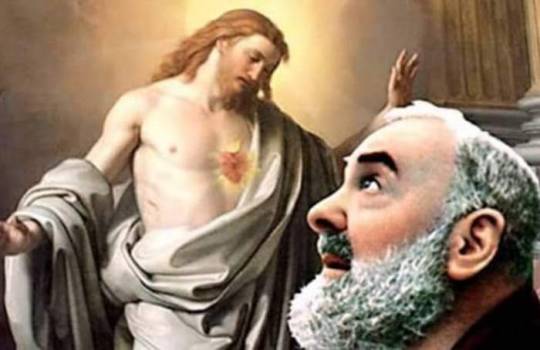
#sacred heart of jesus#padre pio#catholic saints#saint speaks#heaven#miracle#catholicism#traditional catholic#catholic#love#jesus christ#christianity
2 notes
·
View notes
Text

Saint of the day May 05
St. Aventinus, 1180 A.D. Hermit and companion of St. Thomas Becket. A hermit in Tours, France, he was ordained a deacon by St. Thomas and accompanied him to the Synod of Tours in 1163. When Thomas was martyred In 1170 Aventinus went to Touraine, France, remaining there until his death.
Bl. John Haile, 1535 A.D. Martyr of England, a companion in death of St. John Houghton at Tyburn. He was an elderly secular priest, the vicar of Isleworth, Middlesex, when he was arrested by King Henry VIII’s men. John was executed at Tyburn. He was beatified in 1886.
St. Echa, 767 A.D. Anglo-Saxon priest hermit, also called Etha. He was Benedictine who lived at Crayk, near York, England. Hermits such as Echa served as a link to the early Desert Fathers of Egypt.
Bl. Edmund Ignatius Rice, 1844 A.D. The founder of the Congregation of the Brothers of the Christian Schools often called the Irish Christian Brothers. Edmund was born in Wescourt, Ireland, in June, 1762, the fourth of seven sons in a fanning family at seventeen he began working at his uncle’s import-export business in Waterford. He later inherited the business. Married at twenty-five, Edmund lost his wife two years later and was left with a sickly infant daughter. A devout man, Edmund dedicated himself to charitable works. Though he saw how the economic and political storms of the day were impacting Ireland, he desired a religious vocation in the contemplative life. However, the Bishop of Waterford drew Edmund’s attention to the bands of ragged youth in the streets, asking Edmund if he, too, planned to abandon them. Encouraged by Pope Pius VII and Bishop Hussey, Edmund sold his business, arranged for his daughter’s care, and opened his first school in 1802.
St. Hydroc, 5th century. The patron saint of Lanhydroc Cornwall, England.
Bl. Sadoc & Companions, Roman Catholic Dominican missionaries and Martyrs. Sadoc was brought into the Dominican order by St. Dominic himself. Sent to Hungary with a group of Dominican missionaries, he labored among the Hungarians and then went on to Poland, where he founded and served as prior of a Dominican house at Sandomir, in 1260, however, the town was sacked by the advancing Mongols. Sadoc and forty-nine other friars were all put to death while singing the Salve Regina. Feastday May 5
ST. NUNZIO SULPRIZIO, YOUNG WORKER OF NAPLES
St. Jutta, Widowed noblewoman of Thuringia, Germany, noted for visions and miracles. She married at fifteen and raised children. When her husband died on a pilgrimage to the Holy Land, Jutta moved to Prussia, becoming a recluse at Kulmsee. May 5
0 notes
Text
Everyone should Work a Haunt
Humans are the ultimate creatures from elsewhere - nothing is more terrifying than a human lurking in the shadows (just ask all the folks I’ve accidentally frightened over the centuries). One of the best ways to put that innately terrifying talent to good use is to spend a dozen or so October nights working at a haunted attraction. If you already have, you know what I’m talking about. And if you haven’t, you know you want to.
I still fondly recall one particular gal I ‘broke’ back in ‘08. I was disguised as a monstrously evil clown, grinning through a steel mesh amongst several identically dressed fake monstrously evil clowns. Those fake clowns were harmless - they couldn’t spring out at you. They wouldn’t sneak up on you in the shadows and breathe on the back of your neck. I could. From down the long hallway and over the circus music playing on a continuous loop, I hear a young woman announce a familiar refrain, “Oh my god, not clowns - I HATE clowns!” But the crowd she was with pushed her closer, closer - no escape for you, little one! Her eyes were wide and filled with foreboding as she reluctantly drew near my cadre of clowns. Understanding suddenly dawned on her - one of these is real. But which one? They all look the same. Those wide eyes darted about. That one? No. That one? No - maybe? Maybe that one? A new realization - she knows one is real, but she will never know which, until it is too late. In this place, at this time, I am the literal manifestation of ‘too late.’
Of course, I’d already selected Little-Miss-Wide-Eyes-who-HATES-clowns as my prime target. This was my 5th season working a haunt, and my skills were finely honed. My job was to stay as stark still as my mute comrades, patiently wait for the perfect opportunity, and then strike. Miss-Wide-Eyes slides against the bare wall opposite my troupe and I, as far from us as she can get. Sliding by. Sliding by. Sliding...the group stops! Her eyes flutter about, “Why have we stopped?’ she is screaming with her eyes. She’s practically crying, now. A young couple stand between her an I. They are not scared. The boyfriend looks closely at me. He thinks I’m real, but he’s not sure. He reaches through the mesh and squeezes one of the fingers of my oversized gloves, but that part is just foam, not flesh and bone. I remain motionless. He withdraws his hand in disappointment and glances about at the other, infinitely less lively, clowns. His girlfriend smacks him and says, “They’re not real, dumb-ass.” If ever there was a gift from the demigods of fright, it was this moment. I lunged at the mesh and growled, “WRONG!” Everyone within 10 feet jumped & screamed. Everyone except Miss-Wide-Eyes. She just stood against the wall - frozen and motionless. Then slowly, ever so slowly, she slid down the wall until she was sitting on the ground - her eyes never leaving me. I leaned forward a bit, looking right at her and made a slashing motion across my throat, pointed at her, and then sprung through a hidden door towards her. She moved like one possessed by demons - this 100 pound gal knocked aside full grown men twice her weight in a panic-filled effort to get away - far away! She bowled over all in her path, children, the elderly, puppies and kittens - none could impede her escape - and just like that, she was gone. They say she is still running, to this very day. And I’m sure she still is - if only in the darkest recesses of her mind.
A couple of my coworkers witnessed that bit of comedy gold, and everyone had a good chuckle once the group had passed - it’s fun to scare people. And the folks you work with at a haunt and the camaraderie you form are half the fun. Everyone should work at a haunt at least once, especially if you are among the darkly inclined.
Here’s how. Usually around August, haunts will start accepting applications and begin to hold auditions. Think of a haunt as a play, except the audience walks through it rather than sit and watch it. You, are an actor, so if you have any acting experience, be sure to let the folks running the haunt know - school plays, church plays, playing the banjo at the corner stop light with a sign around your neck that reads, “Will banjo fer fud,” will do. Be sure to include a current photo (a head shot) - you may have the perfect ‘look’ and not even know it. If they decide to, they’ll bring you in for an audition. You’ll likely notice an unusually large number of us goth folks at said auditions, but if you’re a normal, that’s fine too. Your audition will likely be something like, “Ok, be scary.” Be prepared! Double jointed? ‘Break’ your arm and shuffle about like the walking dead. Can you do scary voices? Voice away. Contortionist? Contort. Remember, they need victims, too - if you can scream full on bloody murder - bloody murder scream away. But even if you’re not acting-inclined, most haunts are always hurting for makeup artists (goths!), costume assistants (goths!), technicians (geeks!), and security (really big goths & geeks) - so you can still join in on the fun even if you have that crippling case of stage fright.
You will have fun, but remember, this is a job and it is, and I cannot stress this enough, really hard work. You will get paid some, but not much. You will lose your voice. You will be exhausted. You will encounter jerks. But you will have epic fun. I still fondly remember going with my shiny new haunted house friends to Denny’s at 2 am after our show, still in full gore makeup, and having a blast.
I don’t work the haunts anymore. Once the bones start creakin’, you’re no good for sneakin’. But I still enjoy going to them as a regular customer every October, and Florida has just as good as any. From that little out of the way haunt you can only find by getting lost, all the way up to the fang and flair of Universal’s Horror Nights in Orlando, October in Florida certainly has more than it’s fair share of scares.
-CreaturesFromElsewhere 1/27/2021


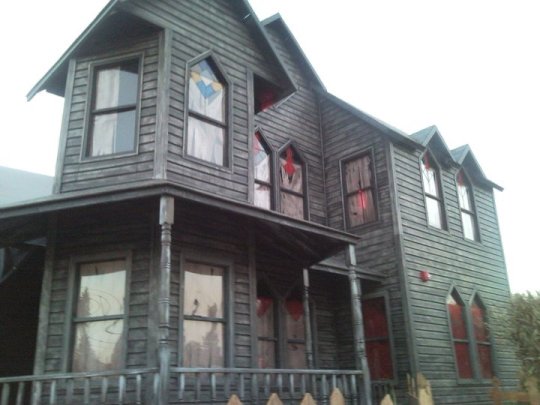





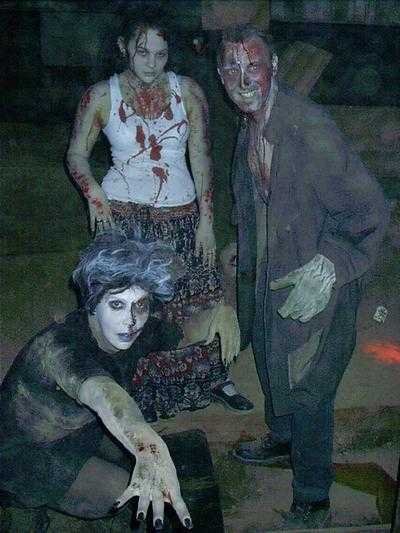



6 notes
·
View notes
Text
Michael John Carley, Autism-Schmautism...In the End, Darius McCollum was Poor and Black, Exceptional Parent Magazine (December 2018)
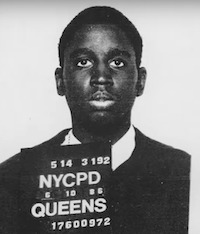
On October 5th, Darius McCollum, the autism world’s previously-unending sideshow, was sentenced to life inside a New York State psychiatric facility. No, he was not relegated back to Rikers island, or any other “normal” prison, as had been the case for the majority of his adult life. He was this time sent to the kind of place where our most dangerous, disturbed, and marginalized individuals are secretly warehoused to endure horror after horror without witness, until the unmarked, mass grave on Hart Island prematurely, and slowly consumes their trauma-ridden, dissociated selves. Darius’ remarkable story of rotating in and out of the prison system for 38 years came to a halt on the worst side of the turnstile. Autism-Schmautism: He is black and poor. We were fools to think this story would end in a restorative manner.
He almost made it. His brilliance, and the subsequent media coverage had all but ensured that he would not slip through the cracks like other poor, spectrum or non-spectrum African-Americans. Darius had a shot because he was noticed. But the final nail came, comic/tragically, from an African-American judge; one who justified ending Darius’ life because Asperger’s Syndrome, to her, is a “dangerous, mental disorder.” In the words of Darius’ lawyer, Sally Butler, “The sweetest guy in the world, never committed any violent acts, never hurt anyone, is going to be held in a hospital with people who slaughter people.”
Judge Ruth Shillingford hasn’t yet apologized with the standard, Kavanaugh-esque backtrack of, “Ok. Maybe I could have used a better choice of words.” But she will. Too many of us have this same “dangerous, mental disorder.” Darius drew a different kind of bigot.
The success rate on appeals is very low. He’s gone.
***
Darius McCollum, as most spectrumfolk know, couldn’t stop stealing subway trains and taking them on joyrides. His first arrest came when he was 15, and over close to the next four decades, he was caught and sentenced over 30 times.
But by his estimation, he was not caught thousands of times.
Like innumerable spectrum children, young Darius had a “thing” for trains. As a fellow spectrumite myself who works in the field, I’ve long thought it funny how the clinical world overthought our too common fascination with rail travel. The simple truth of why we love trains has not to do with the trains themselves…it’s the track. We don’t have to make any decisions about going left here, or right there, thanks to the track. We don’t have to read between the lines, or interpret a thing, as we would driving a car. The track has already determined our destination and our route. Furthermore, we have full control over the speed of the journey. For folks like us? That’s heaven.
How was this possible, though? How could one man, however Houdini-like, sneak into the driver’s seat so easily, time after time after time? Amidst our modern paranoia of mostly imagined terrorist threats looming around every corner—our FOX News hysteria—how did Darius manage so easily to take over the controls while we were the passengers? Well, Darius was brilliant. He not only knew the ins and outs of the New York Metropolitan Transit Authority (MTA) ten times better than any MTA employee, he knew the employee timetables, and how the MTA’s Human Resource department operated. He knew the trends, and the procedures, and he was also gregarious. Darius McCollum really is the sweetest guy you’ll ever meet. So when he’d arrive on the scene in a stolen uniform, and tell the scheduled driver “I just got a free day, man. Lemme help you out.” The uninformed, overworked and underpaid MTA employee usually said, “thanks, man,” and laid back on a welcomed break.
No passenger, it should be noted, was ever hurt when Darius was driving. Not one passenger was even aware that, driving their subway train or bus was someone other than a trained MTA employee. Lastly, Darius’ routes were always finished on time.
***
More than two decades would transpire thereafter that first arrest before we’d hear his name. For us, it all started with a Harper’s article from 2002—Jeff Tietz’s The Boy Who Loved Transit. In the opening paragraphs, Tietz introduced us not only to a train thief, but also a brilliant forger, who brought letters to crews “signed” by MTA managers, dictating that the crews allow “Mr. McCollum” to inspect their safety protocols. Tietz also showed us a concerned outsider, who always attended MTA workers’ union meetings and rallies. Finally, Tietz pointed out to us that Darius only attempted to steal these trains, buses, and equipment. After all, he returned everything he stole. Darius’ behavior originated not in contempt. He loved the MTA, and all its inner worlds.
But despite a diagnosis of Asperger’s Syndrome, one that should have explained his lack of criminal intent, he got idiot judge after idiot judge—monsters of an unfair, impotent, racist, and arcane criminal justice system in New York. To them, Darius was too intelligent, too polite, and too “white sounding” (as one judge put it) to both have a disability and not have control over his actions.
I first met Darius around that time. He was out on parole but at high risk for going back. People put high hopes that my new organization, GRASP, could help. GRASP was the first real peer-run (i.e. run by people on the spectrum) organization in the autism world, and later grew to become the largest membership organization in the world for adults on the spectrum. That all said, we didn’t have much of a budget, and we weren’t a services organization—we had no contract with the city. The type of help that Darius needed wasn’t complicated, but it was intensive. He needed talk therapy with a shrink that really knew their Asperger’s, peer support, perhaps some Cognitive Behavioral Therapy, some trauma-based therapy, a gym, and a Microsoft Excel class. He came to one GRASP support group meeting, but given his relative stardom, he had a hard time feeling like a part of the group. So he hung out in our office with me on several occasions. I’d work while he’d read. We’d talk. We’d go for walks. We got to know each other.
***
Everyone on the spectrum is different. On one end you might have someone non-verbal, who may never experience a reciprocated sexual relationship, or hold down a steady job for long. But this same individual could in fact be quite happy if surrounded by the right supports and attitudes; as measuring happiness by the capacity for speech is one of the infantile mistakes we used to make in the autism world. Why so stupid? Because on the other end of the spectrum you might have someone very verbal; maybe with an IQ of 180—we have all these famous people diagnosed in retrospect such as Einstein, Beethoven, Edison, Jefferson, Emily Dickinson, every famous mathematician…—whom everyone expects to be the CEO of a Fortune 500 company someday. But because no one explained to them how the social world works, their loneliness intensified until they became a suicide statistic. You can’t dumb this stuff down. We’re complicated.
I hadn’t yet seen anyone whose level of “juice” resembled mine—More functional than most in many capacities, I present well. But I was also inundated with spectrumites who were/are way smarter than I. So while better than most at hiding my cluelessness, until then I had always felt somewhere in the middle of the spectrum, with no real parallel.
Darius McCollum was the first and only time I’ve ever sensed someone whose spectrum gifts and challenges instinctively reflected mine. Four months apart in age, diagnosed at virtually the same age, both only children, our internal makeup seemed identical. Darius didn’t present like me, but I knew that if you took away the experiences of being stabbed repeatedly with large scissors when he was in second grade, the horrific prison rapes and beatings, the lifelong trauma, the brilliance…and that if you then took away my educational opportunities, and blatant white privilege…he was my mirror. People thought I was talented—more talented than I really was—and so I got scholarships that allowed me to divide whatever intelligence I had into many different directions, thus creating a more well-rounded individual…than Darius, who had real intelligence that few wished to recognize, and who in lacking those opportunities directed everything he had to trains. I ended up with an Ivy League Masters degree. Darius didn’t graduate high school.
We may have gotten close—It felt that way; the ease was both inexplicable and beatifically jarring. But I’m not sure. It’s hard to tell when the relationship was never equal; for in addition to both our racial instincts, I was to be the mentor, and he the mentee.
***
By this time, everyone was writing about him. Whether it was the New York Times, the London Times, or every news station…By 2004 Darius had racked up an impressive media portfolio. There would be a play, and a documentary—interpretations of Darius’ life made by people that were not out to exploit him—Good people were always on his side. There was talk of a movie starring Julia Roberts…
However, my main mission with him was contrary. I wanted to try and get him to stop seeing dollar signs from imagined film deals, to stop being addicted to the media attention. In my opinion, this was his real challenge. For in addition to withstanding the temptation to steal more trains came the devaluation of what he would do with his life if he wasn’t stealing trains. It’s difficult enough for ANY ex-inmate to get excited about trying to start a new life…when you’re a convicted felon (very few jobs hire folks with prison records) with no job training, money, or education. Being black just decreases your chances even more. I began running interference to try to de-celebrity his life a little.
And just so you know, of course he would have been a perfect hire for the MTA. But they wouldn’t have him. We tried. We tried the MTA, we tried the MTA’s transit museum (where Darius could be a tour guide), we tried the transit authorities of other cities, we tried Amtrak… But Darius, in his “career,” had shamed these folks. He had shown that their security procedures were a joke, thus pissing off Homeland Security and driving their insurance rates through the roof. Later, the MTA would rebuff our criticisms and escalate the divide even further by demanding re-payment on any possible movie deals. In addition to Darius pinning them down, MTA officials dug themselves a deeper hole by reacting like the petty, insecure bureaucrats they might have always been.
(Speaking of Homeland Security: Darius, in his infinite kindness, had even welcomed a visit from them during one of his jail stints, asking nothing in return. And they, after absorbing much information and consultation that Darius was more than happy to give them, free of charge, about how easy it was to skirt the MTA’s procedures…gave him nothing in return. Again, we are discussing the sweetest, most childlike, least streetwise guy in the world. Today, he is still proud of that meeting as he feels he served his country.)
By then, many media outlets were calling me to reach Darius (who struggled to maintain a consistent phone number), and I was trying to rebuff them. That time would be Darius’ longest stint outside prison. And when he fell off the wagon per se, he did so repeatedly thereafter. Over the ensuing years he would get out and almost instantly get caught taking another car or bus for a joyride. In the absence of access to real supports when he would be out, being a celebrated train thief was the only life he could see. He might not have been wrong.
During those years he also made bad decisions, about people, money, and especially legal representation. Stephen C. Jackson, the celebrity lawyer who gained fame during the Tawana Brawley case, rushed to Darius’ side and filled him with promises of millions. But when Jackson (now deceased) quickly saw that the fame he sought wasn’t forthcoming, he then abandoned Darius without officially dropping his name as Darius’ representative. What this meant was that when Darius, on more than one occasion, would show up from his cell for sentencing or a hearing, that he sat alone in court. The judge would ask where his lawyer was, and Darius could provide no explanation. But because Darius, in the court’s mind, couldn’t represent himself (because of his Asperger’s, the courts deemed him incapable of the decision to switch lawyers), he was then sent back to jail for months, even years once, until a new hearing could be rescheduled. Herein, my power of attorney was worthless.
GRASP didn’t have the means to help, but larger organizations like Autism Speaks and the Autism Society of America (ASA) could have. But neither organization would touch Darius McCollum with a ten-foot pole. The excuse was that they didn’t like the way Darius was using his Asperger’s as…an excuse, and that this made everyone on the spectrum look irresponsible. But to me, this was the excuse—to not have to acknowledge the punishments not fitting the crimes. If people really thought Darius deserved to be raped and beaten for taking subway trains on safe joyrides…I just couldn’t believe that. But I grew to believe that as a poor, black man, Darius for them was a lose-lose proposition. These orgs’ gutlessness did not have justification, but they did have explanation.
My prison visits felt more and more like spankings. I’d arrive, furious with him over the most recent arrest, and I’d lay into him. But at the end of the visit we would have worked it out. I once broke policy, and facilitated an interview with him for Caren Zucker and John Donvan’s book, In a Different Key (I trusted Caren, whom I knew from her days at Nightline when she produced some really fine autism coverage). I laughed in solidarity at the finished book, where they quoted my first words to Darius when I brought them to Rikers…in which I distinctively used an expletive. Donvan had inquired after the visit why I was so harsh with him, and rather than explain that neither Darius nor I came from finishing school, or that this was just the way we showed we cared, I answered in an acknowledgement that maybe it was wrong of me, but that “I visit him.” For at the time, no one else really was.
But then Sally Butler became Darius’ (seriously) pro bono lawyer. And he finally had a real chance…because he finally had a real hero.
***
Forget the nightmare center that Darius will go to (Kirby, or Mid-Island, according to an old colleague), our regular prisons are increasing in violence. Author, Shane Bauer, went undercover for Mother Jones as a $9 per hour Louisiana prison guard (an experience he recounts in his new book, American Prison) and took away a wealth of terrifying information. In a recent interview, Bauer stated that when he was being trained, he was instructed that the proper procedure for when prisoners were stabbing each other, was “to yell, ‘Stop fighting!’ and that’s it. We should not get in between them. We are not going to pay you (the guard) that much…if those fools want to cut each other, than happy cutting.”
And does anyone still think that you can go through long prison experiences without being raped? Are some people still capable of such denial? Unfortunately, yes. We are that naïve, or dumb, or complacent. And it’s mostly the law & order crowd—those who demand punishment, punishment, punishment, even when they acknowledge that punishment (even as a concept) really doesn’t work—that heartily approves of our “nudge nudge, wink wink” relationship with rape. We are complicit in this manner because we want to believe that we live in a society that does not condone rape. But it’s nonsense. We don’t just condone rape, we willingly use it as a coercive tool, and the proof doesn’t lie in drunken college parties. The proof of our societal need to never eliminate rape lies in our prison system.
“According to the Bureau of Justice Statistics, around 80,000 women and men a year are sexually abused in American correctional facilities. That number is almost certainly subject to underreporting, through shame or a victim’s fear of retaliation...To tackle the problem, Congress passed the Prison Rape Elimination Act, signed into law by President George W. Bush in 2003. The way to eliminate sexual assault, lawmakers determined, was to make Department of Justice funding for correctional facilities conditional on states’ adoption of zero-tolerance policies toward sexual abuse of inmates…But only two states — New Hampshire and New Jersey — have fully complied with the act…The Justice Department estimates that the total bill to society for prison rape and sexual abuse is as high as $51.9 billion per year, including the costs of victims’ compensation and increased recidivism. If states refuse to implement the law when the fiscal benefit is so obvious, something larger is at stake…Compliance does not even cost that much. The Justice Department (also) estimates that full nationwide compliance would cost $468.5 million per year.”
— “Why We Let Prison Rape Go On”
Bozelko, Chandra. The New York Times. April 17, 2015
***
This past year, after 38 years of in and out, it was time to roll the dice. Darius’ health had been deteriorating—He has gained tremendous weight and is experiencing rapid hearing loss. His brilliance has become less accessible, having slowly drowned in accumulated trauma.
In January, Sally scored a major victory: she got the Brooklyn District Attorney's Office to finally admit that Darius was not a criminal. But because of how the court still contextualizes non-apparent disabilities, Darius, in order to become relatively free, would have to plead not responsible by mental defect. And there was a big risk herein. As Sally wrote: “If Darius is determined to be dangerous, he will be confined in a truly horrific locked facility for the criminally insane perhaps for life.” But if the judge were to determine that he was not dangerous, he would be “civilly committed for intense treatment with the goal of returning to society with services available to him.”
In talks at the time with the Puerto Rican government on an autism consulting contract, I began looking into a side project of building a treatment center on the island, one that would use Darius as a pilot for low-risk, non-violent offenders with diagnosed non-apparent disabilities. Everyone’s been saying “there’s no proper care available,” even though what Darius needs is not brain surgery, and since no one else was doing it…I dreamt of him taking that Excel class, going to trauma-based therapies, and helping to repair houses in Puerto Rico’s still-reeling infrastructure, one with no transit system—Yes! There would be an ocean between Darius and temptation, if not also a warm, loving populace that would welcome him. The courts would save a ton of taxpayer money and stop enduring the bad public relations. Sally forewarned that getting the powers that be to allow him to receive his treatment outside state lines would be the challenge, but I was confident. It seemed a no-brainer.
I wasn’t alone. We all figured the odds were good. Who in God’s name would sentence this good-natured child to more torture?
But again, Sally and I being white, we forgot that Darius was black.
***
I’m guessing that at best, only 3% of the people that read this article will be African-American. It’s not that I don’t have black readers. As a white writer, I’m confident I have more than most. But for African-Americans, I would imagine that this material, like any material about Darius, reads like the box score of a game African-Americans already saw, participated in from start to finish, and in which their team got its ass kicked. There’s nothing to be learned, and only more heartache to be gained from reading. Maybe as some “militants” might say, everything really is about race. Maybe everything isn’t about Darius’ autism, nor fiscal variations (I especially have professed in the past that everything revolves around economics)…I’m white, so I can’t go there completely, but I could argue that maybe the Judge Kavanaugh hearings weren’t about women if, as a New York Times article reports, 53% of white women were in favor of his confirmation. Maybe the wonderful #MeToo movement will at some point have to address the buried complaints that many men of color, in corporate settings, have about the sexual harassment they’ve endured from many white, female supervisors. Maybe the LGBTQ community will someday acknowledge that a stereotype exists of them all being wealthy liberals—when most are actually poor (and therein, contain many people of color). Maybe the #MeToo heroes can see that while they risked their career track to report harassing bosses, that when this occurs to women of color in factories (that I’ve worked in), that for her and her family that woman doesn’t risk a delay in promotion, she risks homelessness. Maybe even our nation’s bipartisan era isn’t about Trump, but is still about Obama? After all, one look at the farcical complaints many Republicans had about Obama during his tenure, when compared to their silence regarding Trump’s unending list of proven lies? This nation’s divide isn’t about Republicans and Democrats at all…And then there’s Judge Shillingford, pictured on Google images at many NAACP functions, who simply may have seen a Darius we never saw; one who didn’t have the intelligence we knew of, or the indisputably kind nature. Maybe she saw a person who was incapable of a productive life given the right supports…because of his skin color. Maybe she knew better.
Having raised white children in predominantly black, Brooklyn neighborhoods, I can confess to you that every once in a while, a fellow white would let slip their belief that we were throwing our kids’ safety under a bus to prove our liberalness. The truth was the opposite—Because of the trust we’d extended by living there my boys were protected by those communities. The black on black shit is what will astound you.
(“Sidebar, your honor?” An old contact of mine works closely to [but not in] the Brooklyn District Attorney’s office. Not to go spy-novel herein, but this “source” felt that Shillingford will not be reprimanded for this ruling or her language. She may actually be rewarded. My contact’s theory is that the Shillingford’s “shortcomings” regarding her knowledge and feelings about developmental disabilities, are well known by the Brooklyn DA, Eric Gonzalez. Shillingford may have been set up to take the bullet for a DA’s office that has wanted this ending for Darius all along. And this would make sense; for Gonzalez’s office seems intent on preserving a progressive aura; yet in the case of Darius McCollum has never negotiated in good faith.)
Whether you are African-American, Spanish, on the spectrum, LGBTQ, or Muslim…any minority will always feel doubt about their way of doing things, even if that way is brilliant. And any majority will have supreme confidence in their way of doing things, even if their way is so dumb it’s beyond repair. Unless we are all educated otherwise, that’s simply how majorities and minorities think.
***
I can’t compartmentalize Darius McCollum as the screwup twin brother who couldn’t stop breaking my heart, or as the African-American who only had a chance in our dreams. Darius will perhaps best be categorized as the human being who consciously made us face our capacity for cowardice and inaction. For I could cry at will, in gratitude, for the fact that I was raised on this one notion: If in the course of your job, you have to turn a blind eye to a giant injustice? Then it is time to look for another job. These days, this concept feels more than lost. Judge Shillingford cowardly stated in her sentencing that her “hands (were) tied.” Bull. The judge is a bigot, perhaps twice over (though I can’t make that call). Because she is both a female and an African-American, and I am a white male, I will grant that she had it harder than me—I’d bet a limb on it. But the end result matters too.
I know I’m angry. And in my anger, I erroneously feel it’s my duty to look upon her, and maybe Gonzalez, as garbage human beings. But I think the real duty for us all is to acknowledge that they are not alone.
#racism#ableism#darius mccollum#real folk heroes of the 21st century#travesties#miscarriages of justice#outrage#autism#asperger syndrome#transit#transit history
6 notes
·
View notes
Text
Will created the Mindflayer (Theory revisited)
After, watching all 3 seasons I believe the upside down/mindflayer is not only an allegory for Will and El’s (cannon) ptsd/ and trauma but also (because of their powers), has become a physical manifestation (with a life of it’s own). I previously talked about how El made the upside down/demorgorgans and how Will created the mindflayer and demodogs (before s3). However I wanted to add more details to this analysis and focus on how the Mindflayer represented Will’s darker emotions and thoughts in s3 . So let’s get started.
The original title for Stranger things was “Montauk”- in reference to the Montauk Project. It was about experiments conducted on psychic children, where the scientists would “break” them psychologically to strengthen their powers and to program them. In one of the stories there was a boy named Duncan who could “open portals to other dimensions and periods of time” . However, one day “Duncan let loose a monster from his subconscious.”

This is where Stranger Things comes in... El, opened the portal and created the demorgorgans, which represented El’s fears. Joyce and Nancy called the demorgorgan a “man without a face”, or as El called them repeatedly “the bad men.” The bad men kill (using guns), while the demorgans are attracted to blood. However, the one time they went after someone who wasn’t bleeding- was when it chased after Will, another psychic child. Brenner even says about the demorgorgan “it’s calling to you for a reason”. And right before El goes to the sensory deprivation tank, Brenner gives her flowers (resembling the opened face of the demorgorgan which resembles a flower). In the Stranger things novel, Suspicious Minds, a psychic character named Alice, even says “ “Monsters...of course my brain has them.” As long as they stayed in there, everything would be all right. “Wouldn’t it?”
The upside down/ opening of the gate/demorgorgan is even described as something that grows and spreads, “like a cancer”. And something that will eventually kill her, if not confronted (and analogy to suicidal thoughts?)
In s1 Dusting even asks, Eleven “Do you have cancer?” In a literal sense no, but the buzzcut ( which makes people assume she has cancer) represents the abuse she’s been through. And if she doesn’t confront her trauma it will slowly eat away at her until it kills her . Or the physical manifestation of it will.
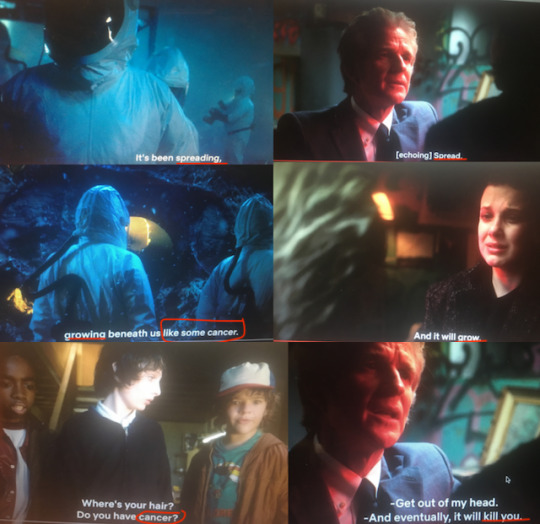
The name El is the name of a Canaanite God, which means “god of creation.” When El said in s1 “I’m the monster”, only for Mike to correct her and disagree. In a way they’re both right, it’s not her who is in control. But the monsters (who has a life of its own) represents her darker emotions and fears and is affected by her feelings- and this is why they were mirrored to each other visually.
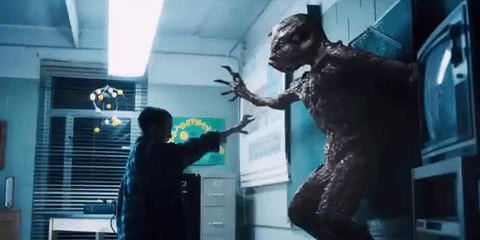
So the fact that the Mindflayer shows up for the first time when Will is experiencing his “anniversary effect” relating to his ptsd, may not be a coincidence. Don’t you find it strange when Will’s dog died between s1-2, the demorgorgans become demo-dogs? And once again, the vines ( put inside Will in s1) and the shadow monster/Mindflayer - are also described as spreading, and we are told that it will kill Will. Will even says “ the more he spreads the more connected to him I feel.” And if I’m right about Will becoming number 12, it’s interesting to point out that 12 is a numeral symbol for “God of creation”, as well.
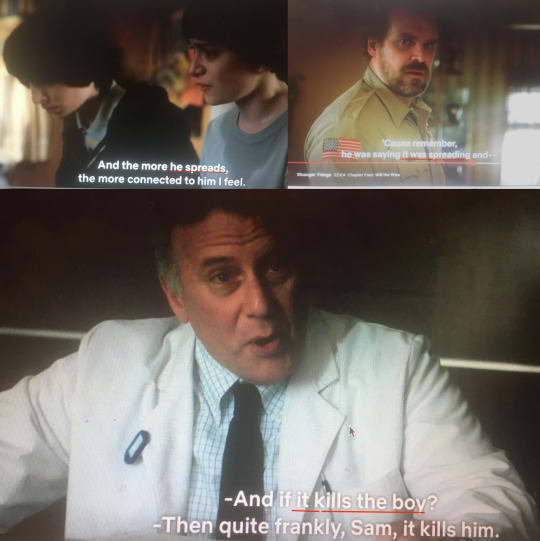
The other Drs/scientists are extremely callous and say they need to continue the burn (even if it kills Will). However, Dr Owens even says after this “You’re putting a bandaid on this.” Meaning they aren’t addressing the real problem- Will & El’s trauma.
And I hate to be the bearer of bad news, but if I’m right- this also implies Will was m***sted as a kid (probably by Lonnie), who always called him homophobic slurs. The demorogorgan represented ‘Brenner/ the bad-men’ to El. And the Mindflayer initially represented Lonnie, to Will . Will is even the first to call the Mindflayer a “he”, instead of an it- even though in d&d cannon Mindflayers are “sexless hermaphodites”.
Also,Will doesn’t initially call the Mindflayer a “he” but an “it”.And if you only take out certain pieces of dialogue between Joyce and Will, when they first talk about the mind flayer, where they only refer to it as an ‘it’ … and if you put [‘he/him’] pronouns there instead… then the rest of the discussion about the mind flayer literally sounds… questionable.
Will: “It all just went blank and then you were there”
Joyce: “Will I need you to tell me the truth.”
Will: “I am!”
Joyce: “But … But I can’t help you if I don’t know what’s going on. So you have to talk to me. Please. No more secrets, okay? Okay.”
Will: “ [*It] came for me and … and I tried… I tried to make [*it] go away … but [*it] got me mom”. (*he, * him,* he)
Joyce: What does that mean?”
Will: “I felt [*it] everywhere. everywhere. I- I still feel [*it]. I just want this to be over!” (*him, *him)
Joyce: “LOOK AT ME! I Will never let anything bad happen to you ever again!”
And I’m not sure how seriously I should take the cannon spotify playlists. But, the cannon spotify character playlists (which netflix and spotify worked on and published together after s2) alluded to this on both Jonathan and Will’s playlists. And the only songs about their dads hint at this fact.
Jonathan’s Playlist- We’re happy family: “Eating refried beans (poverty). Gulpin’ down Thorazines (pills for a mood disorder). We ain’t got no friends (s2 ref). Our troubles never end. Daddy likes men. Daddy’s telling lies.”
Enter sandman: “Don’t forget my son. Sleep with one eye open. Gripping your pillow tight, Exit light, Enter night. Take my hand, we’re off to never-never land. Something’s wrong, shut the light, heavy thoughts tonight. Dreams of liars and of things that will bite, yeah. Hush little baby don’t say a word, and never mind that noise you heard. It’s just the beasts under your bed, in your closet in your head.”
Will’s playlist- Creature comfort: “Some boys hate themselves
spend their lives resenting their fathers…Some boys get too much, too much love, too much touch... look in the mirror and wait for the feedback”
And if the vines and the shadow monster represent his dad the fact it enters violently through his mouth, and the way he describes the Mf first possessing him further reinforces this analogy. Especially since Billy/MF lays on top of his victims, and right before the monster puts a similar thing in their mouths says (To Heather) “Don’t be afraid. It’ll all be over soon. Just stay very still”, and (to El) “Don’t be afraid . It’ll all be over soon. Just try and stay... very still.” (May indicate Will might have have heard his dad say this to him, and thats why the Mf says it to his victims.)
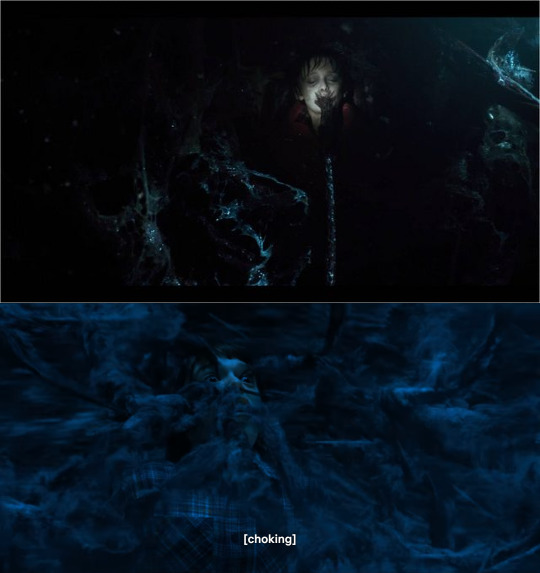
The entry of the vine, even causes him to spit out a slug, as he looks back in the mirror (like in the song lyric).
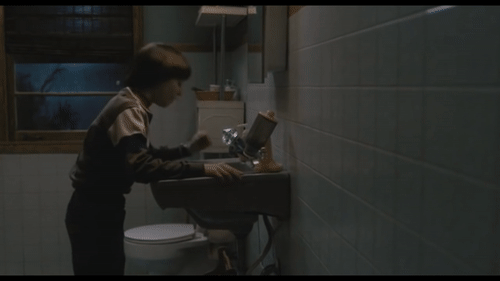
The experience of the vine/slug probably brought back traumatic memories, not to mention his time in the upside down invented new ones. The mindflayer first appears during Will’s ptsd “anniversary effect”. And in s2 when Joyce asked about the mindflayer drawing, Will lies saying it’s for a story he’s writing . But maybe, unbeknownst to him... it wasn’t actually a lie ? The 1st time Will senses the Mf again in s3, is when he’s watching a movie about zombies (on a ‘date’ with Mike). And in s3, the monster the Mf creates is based “the thing” ( by merging zombies bodies together)... and we see Will writing the d&d story right next to this ‘The Thing’ poster. The light at it’s head, indicating this whole story may be Will’s idea all along.
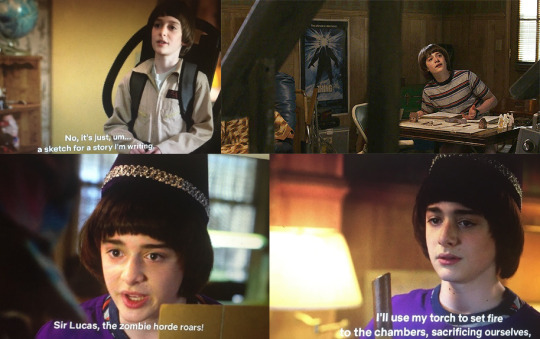
So ‘the thing’, the zombies, defeating it with fire were all referenced to Will- and later showed to unfold in the Mf’s story. And even though d&d always foreshadows later events in the season, I find it interesting that the one time in the series we see Will write the d&d story... is when it matches MF’s plans. The shadow monster stayed in the real world, after the gate closed (and didn’t do anything for 6 months)? And specifically choses to attack/possess a guy named William who also was abused by his dad and called homophobic slurs (internalized hate perhaps)? And don’t you find it strange that the shadow monster only decides to come out now, in the summer (despite it not liking hot temperatures) when Will is at his lowest point emotionally? Well, it’s because the MF is based on Will’s darker emotions and thoughts.
S3 was the season that Will was feeling jealous over mileven, and probably coming more to terms with his sexuality - and this is when the mindflayer/shadow monster decides to strike. Whenever the Mf is close and Will touches his neck relates to his romantic feelings for Mike. 1st time it’s on one of their ‘movie dates’, 2nd time when Mike and El walk off together down the hill, 3rd time right after he smashed castle byers after Mike says “it’s not my fault you don’t like girls”, 4th time when Mike asks him to go away so he can talk to El in the hospital waiting area, and 5th time when Mike says El loves El.
And again it’s when Will smashes castle Byers that Will first says “He’s back”. Castle byers was built on a rainy night , the same day Will’s dad left, when Will was 5 (the same age he met Mike). And lonnie called him a “queer” and a “f*g” and forced him to do “normal things” like baseball to have him “be more of a man”. And then on a rainy night, after Mike says “It’s not my fault you don’t like girls”… what does Will destroy castle byers with? A bat.
Will drew up castle byers before creating it in the real world. And the fact Will has a baseball bat (despite not liking baseball) in Castle Byers, surrounded by things he loves: drawings, d&d, art supplies, a microscope, comics- just shows what an impact Lonnie’s problematic conditioning and abandonment had on him. He used a baseball bat to destroy something he loves -castle Byers, and symbolically he was trying to reject his feelings for Mike using Lonnie’s old tactics of fixing him. So regardless of what Lonnie did or didn’t do, the correlation between the MF and Lonnie is there. He smashes up castle Byers with a bat (thinking of Lonnie) and then he feels “more connected to him (the Mf)” again, and says ‘he (the Mf) is back’.
The reason we didn’t get Willel, was for a narrative reason. We are shown that Max and El don’t know each other. It’s implied that El almost never leaves the house and just spends her time kissing Mike. So Will never got to have the opportunity to get to know her either. And for Will his resentment of El isn’t simply based on the fact he loves Mike. He insults El calling her a “stupid-girl” just like how Robin said she hated Steve and his “stupid-hair” because the girl she liked , liked him- and of course a lot of that redirected hate isn’t mere jealousy, but projected internalized homophobia. I don’t think a straight person could ever really understand how much hate queer people initially have for themselves when initially figuring things out- so his redirected anger is more than simple jealousy, but just hate for himself. He even looks at a picture of Mike after this and says “so stupid”, 4 times , while at castle Byers.
But honestly, that’s nothing compared to the hate he has/ how he blames her for ruining his life! El might have saved him twice (and it might of been an accident/ dr Brenner who’s really to blame). But Will knows she opened the gate . So to him, he spent a week in a place with no sunlight, food, or breathable air , having to experience that vine, dying, getting ptsd, being ostracized by everyone at school and being called “zombie boy” and a “freak”- being possessed by the MF, getting burned alive, killing Bob (the closest thing to a real father figure) and all those men (making him a murderer), and strangling his mom.Because of her!
And then that’s when s3 starts to make a lot more sense. Will might not want anything bad to actually happen to El but he’s probably had these dark thoughts before. Will even says about the MF.
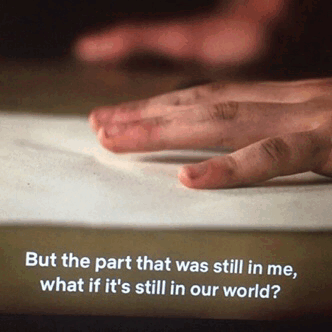
He says the real Mf is still in the upside down, but ‘the part that was still in him... was still in their world.’ And it flashes to El’s face as he says it. Essentially the Mf is motivated by his fictionalized story, thoughts/memories of Lonnie, and any dark intrusive thought Will has ever had about El , much to Will’s horror.
He said in s3 that “I’m not worried about me, mom. I’m worried about you.” So the fact that he strangled her and almost killed her in s2, probably haunts him to this day- and he might of thought, ‘wish I strangled her instead’. And who does Billy/Mf look at right before grabbing her throat, and who is the first reaction shot we see when he starts choking her - Will’s horrified expression!

Maybe the Mf thought El was the most important, and that Will was nothing ( despite all the foreshadowing indicating the Mf held special intentions for Will), because he feels like he’s nothing compared to El? Will even says in s2 it wanted to kill everyone, but him, but now it’s saying that to El only? Maybe because Will wanted her to experience having such an entity say it to her too, and experience the same fear and isolation it caused him? In s2, why did the Mf chase Will and possess him at the school, when El (at the same time) was at the school as well (if it was always after her)? It’s because the Mf’s motivations are linked to Will’s feelings/emotions.
He probably also thought, how would you like a slug crawling/invading your body, huh?And although it doesn’t go to her mouth (probably because he could never wish that on anyone- if it symbolizes what I think it does). She still has a similar experience. And everyone is worried/horrified but Will is the only one sobbing (probably because he thought of this happening to her before).

After this he doesn’t even help move the car, he just stays glued at El’s side as if trying to protect her. And interestingly, this is when El loses her powers. Will may have even thought. If she never had her powers, none of this would have ever happened! Or ‘you guys wouldn’t think she’s so great without her powers.” So did Will accidentally steal her powers?!!!! Maybe. Will has always been associated with bears (along with 3 other animal symbols that El also has). We see a zoom in shot of Will’s bear drawing right before the demorgorgan takes him from the upside down version of castle byers in s1. Bears symbolically represent “wisdom” like ‘Will the wise’ and were associated with the demorgorgan/upside down in s1 and 2 as well . Max and Nancy both compared demorrgorgans to bears- and Nancy and Jonathan used a bear-trap to capture the demorgorgan in s1. So when El tries to grab Will’s teddy bear (it was shown to be his in s1) with her powers. And Mike says “they’ll come back”. They might actually come back, because Will and EL’s relationship improves. Mike even tried to give El a golden bear as a gift (so maybe that signifies the giving back of her powers in s4 ?)
Will was always hinted to have powers from the very beginning, so it would be incredibly stupid to just drop this plot point, despite all the foreshadowing. In the 1st episode, Will wins Dustin’s xmen comic in a bet- and Dustin later asks the gang “Do you think Eleven was born with powers like the xmen?” And also before he was sent to the upside down his password for Castle Byers was ‘Rhadagast’ a wizard character from Lord of the Rings. And in the ST prequel novel “Suspicious Minds” the adult psychics were referenced to both the xmen and lord of the Rings characters. And in the comic, he keeps on saying ‘what would Will- the Wise do’ (his d&d wizard character). Also Dustin straight up called El a “wizard” in the last ep of s1, at Will’s bedside. Not to mention Mike in s2 called Will a “cleric” - and clerics get their powers from a god (cough the mindflayer), and in d&d the wiser the cleric the more powerful they are. And Will’s nickname is ‘Will the wise’? The fact that Will in s1 drew his character with lightning and fire powers- and the fact he barbecued 2 phones in s1 (just like El did to the radio at the school). In s1 was said he could “shadow walk” a wizard d&d power. The fact he could control lights and manipulate electronics to communicate to his mom from another dimension (and in s1 only El could do that). The fact he literally created a portal through the wall of his house (just like El did at the school in s2). And just the many other hints in s1! The fact that he drew himself in s2 with a crystal ball (which is associated with the powers of scrying and clairvoyance) before being possessed, but just so happen to have those abilities in s2. Dustin also said the only way to defeat the MF is an undead army and Will’s nickname is “zombie boy”. So frankly, his fight with the MF (who is still in the upside down) may not be over. And that new demorgagan in Russia might be a symbol of El’s grief over Hopper’s (perceived) death.
This would honestly, be the only explanation that would allow me to forgive the Duffers . Like you can steal this idea from me! Please! XD
999 notes
·
View notes